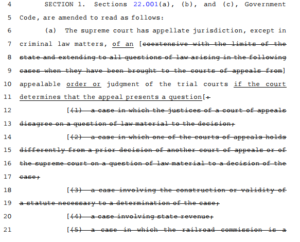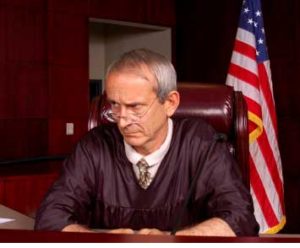 A detailed road map for a sustainable award of death-penalty sanctions appears in Hill v. Spracklen – “In their motion to impose death-penalty sanctions, the Spracklens catalogued Hill’s history of misconduct, including his deliberate and continuing violation of multiple court orders and his abusive and defiant behavior at his deposition. In granting the Spracklens’ request for death-penalty sanctions, the trial court [also] considered . . . the admission of Hill’s counsel that Hill chose not to appear at the hearing. In addition, in the final judgment, the trial court found Hill’s conduct during trial provided additional support and grounds for striking Hill’s pleadings . . . At trial, Hill introduced documents he should have produced during the course of the case, but failed to do so despite having been repeatedly ordered to do so, and presented what appeared to be inconsistent forms of the contract Janet Spracklen supposedly signed.” No. 05-17-00829-CV (July 12, 2018) (mem. op.)
A detailed road map for a sustainable award of death-penalty sanctions appears in Hill v. Spracklen – “In their motion to impose death-penalty sanctions, the Spracklens catalogued Hill’s history of misconduct, including his deliberate and continuing violation of multiple court orders and his abusive and defiant behavior at his deposition. In granting the Spracklens’ request for death-penalty sanctions, the trial court [also] considered . . . the admission of Hill’s counsel that Hill chose not to appear at the hearing. In addition, in the final judgment, the trial court found Hill’s conduct during trial provided additional support and grounds for striking Hill’s pleadings . . . At trial, Hill introduced documents he should have produced during the course of the case, but failed to do so despite having been repeatedly ordered to do so, and presented what appeared to be inconsistent forms of the contract Janet Spracklen supposedly signed.” No. 05-17-00829-CV (July 12, 2018) (mem. op.)
Author Archives: David Coale
 The Taylors argued that their medical malpractice case against UT-Southwestern was timely filed, even though they erroneously filed it against the University of Texas System, relying on the doctrine of “misidentification.” While suing the wrong party does not ordinarily toll
The Taylors argued that their medical malpractice case against UT-Southwestern was timely filed, even though they erroneously filed it against the University of Texas System, relying on the doctrine of “misidentification.” While suing the wrong party does not ordinarily toll  limitations, it can “if there are two separate, but related, entities that use a similar trade name and the correct entity had notice of the suit and was not misled of disadvantaged by the mistake.” The Fifth Court concluded that “University of Texas Southwestern Medical Center” and “University of Texas System” were not sufficiently similar to invoke this doctrine; additionally, the Taylors did not establish UTSW’s knowledge of the suit or a lack of prejudice to it. The opinion also addresses, and rejects, the related doctrine of “misnomer.” UT-Southwestern v. Taylor, No. 05-17-01221-CV (July 6, 2018).
limitations, it can “if there are two separate, but related, entities that use a similar trade name and the correct entity had notice of the suit and was not misled of disadvantaged by the mistake.” The Fifth Court concluded that “University of Texas Southwestern Medical Center” and “University of Texas System” were not sufficiently similar to invoke this doctrine; additionally, the Taylors did not establish UTSW’s knowledge of the suit or a lack of prejudice to it. The opinion also addresses, and rejects, the related doctrine of “misnomer.” UT-Southwestern v. Taylor, No. 05-17-01221-CV (July 6, 2018).
 In a win for our law firm, the Fifth Court rejected a personal jurisdiction theory based on alleged misrepresentations to a Texas business by a resident of Greece.”‘Even assuming that the phone calls, [e-mails, and video conference] were sufficiently connected to the claim, a proper minimum contacts analysis looks to the defendant’s contacts with the forum state itself, not the defendant’s contacts with persons who reside there.’ In addition, we have held, alleged ‘fraudulent or negligent misrepresentations made through electronic media do not establish specific jurisdiction.’ And as the supreme court concluded with respect to a Canadian entity in Searcy and based on the special appearance record, Theofanopoulos ‘had no control over’ where the executives of MoneyGram ‘happened to be located[,]’ ‘did not desire to create an ongoing relationship with Texas, enjoy the benefits of our laws, or profit from our thriving economy.'” MoneyGram v. Theofanopoulos, No. 05-17-00798-CV (July 6, 2018) (mem. op.) (citations omitted).
In a win for our law firm, the Fifth Court rejected a personal jurisdiction theory based on alleged misrepresentations to a Texas business by a resident of Greece.”‘Even assuming that the phone calls, [e-mails, and video conference] were sufficiently connected to the claim, a proper minimum contacts analysis looks to the defendant’s contacts with the forum state itself, not the defendant’s contacts with persons who reside there.’ In addition, we have held, alleged ‘fraudulent or negligent misrepresentations made through electronic media do not establish specific jurisdiction.’ And as the supreme court concluded with respect to a Canadian entity in Searcy and based on the special appearance record, Theofanopoulos ‘had no control over’ where the executives of MoneyGram ‘happened to be located[,]’ ‘did not desire to create an ongoing relationship with Texas, enjoy the benefits of our laws, or profit from our thriving economy.'” MoneyGram v. Theofanopoulos, No. 05-17-00798-CV (July 6, 2018) (mem. op.) (citations omitted).
 The Fifth Court found a sufficient fact issue to reverse a summary judgment in 6200 GP LLC v. Multi Service Corp., in which an affiant’s testimony was found not to be conclusory when:
The Fifth Court found a sufficient fact issue to reverse a summary judgment in 6200 GP LLC v. Multi Service Corp., in which an affiant’s testimony was found not to be conclusory when:
- his testimony about the relevant assignment was not conclusory, when his affidavit explained his roles in the businesses, his relationship to the transaction, and the business structure relevant to the transaction;
- an objection that the testimony “cite[d] no, let alone contemporaneous facts or document evidencing the alleged transactions or Prime’s intent” was not well-taken, since “[a] person may testify to a sale and assignment without providing any documentary evidence,” and the testimony as in fact supported by the witness’s understanding of “journal entries and [a] tax work sheet.”
No. 05-16-01491-CV (June 28, 2018) (mem.op.)
 Courtesy of the Huffington Post, here are seven good trivia questions about the Declaration of Independence to enjoy on your July 4 holiday.
Courtesy of the Huffington Post, here are seven good trivia questions about the Declaration of Independence to enjoy on your July 4 holiday.
 The Fullers won a judgment against the Balthazars for a fraudulent transfer, arising from an earlier state court proceeding. The Fifth Court eliminated two elements of their judgment. First, it limited their recovery to “the value of the assets the Fullers proved were fraudulently transferred,” rather than the entire amount of the previous state-court judgment. Second, it did not allow recovery for a discovery sanction levied in the original case, as the Balthazars were not parties to it, and the sanction did not come within the statutory measure of “the value of the asset transferred . . . or the amount necessary to satisfy the creditor’s claim, whichever is less.” Balthazar & Sons v. Fuller, No. 05-17-00956-CV (June 25, 2018) (mem. op.)
The Fullers won a judgment against the Balthazars for a fraudulent transfer, arising from an earlier state court proceeding. The Fifth Court eliminated two elements of their judgment. First, it limited their recovery to “the value of the assets the Fullers proved were fraudulently transferred,” rather than the entire amount of the previous state-court judgment. Second, it did not allow recovery for a discovery sanction levied in the original case, as the Balthazars were not parties to it, and the sanction did not come within the statutory measure of “the value of the asset transferred . . . or the amount necessary to satisfy the creditor’s claim, whichever is less.” Balthazar & Sons v. Fuller, No. 05-17-00956-CV (June 25, 2018) (mem. op.)
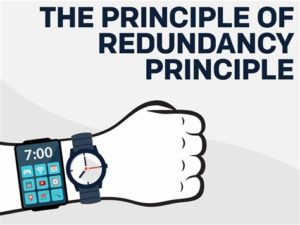 In a dispute about the propriety of an expert’s testimony in a medical malpractice case, the Fifth Court reminded that “the erroneous admission of evidence is harmless if it is merely cumulative,” found that “[the expert’s] testimony was not the only basis on which the jury could find that Rudman was not negligent,” and described three other witnesses who spoke to the relevant issue. As to the disputed opinion, then, ” its admission was harmless.” McPherson v. Rudman, No. 05-16-00719-CV (June 21, 2018) (mem. op.)
In a dispute about the propriety of an expert’s testimony in a medical malpractice case, the Fifth Court reminded that “the erroneous admission of evidence is harmless if it is merely cumulative,” found that “[the expert’s] testimony was not the only basis on which the jury could find that Rudman was not negligent,” and described three other witnesses who spoke to the relevant issue. As to the disputed opinion, then, ” its admission was harmless.” McPherson v. Rudman, No. 05-16-00719-CV (June 21, 2018) (mem. op.)
 Skyline Commercial v. ISC Acquisition addressed several aspects of the interplay between an express contract and the doctrine of quantum meruit, including:
Skyline Commercial v. ISC Acquisition addressed several aspects of the interplay between an express contract and the doctrine of quantum meruit, including:
- A statement about the scope of a contract, made in response to a motion to transfer venue, did not conclusive resolve the viability of the quantum meruit claim because a party may not judicially admit a question of law;
- The trial court correctly used the applicable Pattern Jury Charge about quantum meruit (reminding, “a trial court should not embellish well-settled pattern jury charges with addendum”); and
- The jury properly weighed conflicting testimony about whether the defendant knew of the relevant orders – and the plaintiff’s expectation of payment for them.
No. 05-17-00028-CV (June 22, 2018) (mem. op.)
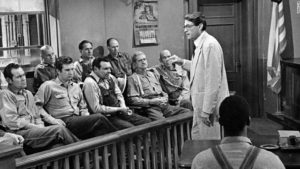 Wal-Mart v. Bishop affirmed judgment on a jury verdict against Wal-Mart arising from an in-store injury; among other issues, the Fifth Court addressed several challenges to closing argument. The discussion is practical and of broad interest to trial lawyers. The specific issues, as stated by Wal-Mart, were whether the trial court erred when it allowed plaintiff’s trial counsel “to make improper jury arguments that discussed theories of liability not submitted to the jury; characterized Walmart in a manner intended to inflame the passion of the jury; misled the jury as to the reason Walmart did not present evidence on the reasonableness and necessity of Bishop’s past medical expenses; and characterized conflicting sworn statements by Gajurel as constituting ‘perjury.'”
Wal-Mart v. Bishop affirmed judgment on a jury verdict against Wal-Mart arising from an in-store injury; among other issues, the Fifth Court addressed several challenges to closing argument. The discussion is practical and of broad interest to trial lawyers. The specific issues, as stated by Wal-Mart, were whether the trial court erred when it allowed plaintiff’s trial counsel “to make improper jury arguments that discussed theories of liability not submitted to the jury; characterized Walmart in a manner intended to inflame the passion of the jury; misled the jury as to the reason Walmart did not present evidence on the reasonableness and necessity of Bishop’s past medical expenses; and characterized conflicting sworn statements by Gajurel as constituting ‘perjury.'”
 The third prong of the Craddock test for setting aside a default judgment – that the defendant “file the motion at a time when granting it will occasion no delay or otherwise work an injury to the plaintiff” – is commonly cited when awarding attorneys’ fees to the plaintiff. The plaintiff in In re: CGI Construction went a step further and also obtained a requirement that the defendant waive its contractual right to arbitrate. The Fifth Court conditionally granted mandamus relief, finding as a matter of law (in light of the strong policy favoring arbitration) that “the trial court may not condition the granting of a new trial and motion to set aside default judgment on waiver of contractual arbitration rights,” and that the plaintiff did not otherwise establish evidence of injury (a lost witness, etc.) if arbitration proceeded. No. 05-18-00320-CV (June 18, 2018) (mem. op.)
The third prong of the Craddock test for setting aside a default judgment – that the defendant “file the motion at a time when granting it will occasion no delay or otherwise work an injury to the plaintiff” – is commonly cited when awarding attorneys’ fees to the plaintiff. The plaintiff in In re: CGI Construction went a step further and also obtained a requirement that the defendant waive its contractual right to arbitrate. The Fifth Court conditionally granted mandamus relief, finding as a matter of law (in light of the strong policy favoring arbitration) that “the trial court may not condition the granting of a new trial and motion to set aside default judgment on waiver of contractual arbitration rights,” and that the plaintiff did not otherwise establish evidence of injury (a lost witness, etc.) if arbitration proceeded. No. 05-18-00320-CV (June 18, 2018) (mem. op.)
 The Fifth Court conditionally granted mandamus relief as to the denial of a forum non conveniens motion in In re Ace American, a dispute about the denial of a workers’ compensation claim made by an Arizona resident against an Arizona employer. The claim was reviewed by a Dallas-based adjuster. The Court found that all relevant factors favored Arizona, noting in particular that:
The Fifth Court conditionally granted mandamus relief as to the denial of a forum non conveniens motion in In re Ace American, a dispute about the denial of a workers’ compensation claim made by an Arizona resident against an Arizona employer. The claim was reviewed by a Dallas-based adjuster. The Court found that all relevant factors favored Arizona, noting in particular that:
- No authority appeared to support the claim that “the importance of the power to compel witnesses to appear at trial is overemphasized . . . live testimony of physicians, for example, is rare . . . [and] use of video depositions of witnesses obviates the need for witnesses to attend trial,” and
- While part of the alleged tort may have occurred in Texas, the weight of authority did not foreclose that other parts of the alleged tort could have occurred elsewhere – in other words, that there was no singular “place of the alleged wrong” for purposes of the “local interest / localized controversies ” factor.
No. 05-17-01032-CV (June 15, 2018) (mem. op.)
 I am speaking this week at the 28th Annual Conference on State and Federal Appeals sponsored by the University of Texas School of Law; my topic is a “Fifth Circuit Update” and this is my PowerPoint.
I am speaking this week at the 28th Annual Conference on State and Federal Appeals sponsored by the University of Texas School of Law; my topic is a “Fifth Circuit Update” and this is my PowerPoint.
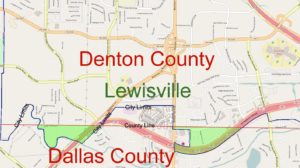 X Extreme Construction won a $200,000 judgment in Dallas district court against three defendants. One of the defendants then sold his house, after which X Extreme obtained a receivership over, inter alia, the sales proceeds. After more skirmishing, the Dallas court issued a writ of execution to sell the house; the purchasers filed suit in Denton County to enjoin the sale; and the Dallas court ordered the purchasers to dismiss the Denton case. The resulting standoff led to a petition for writ of mandamus, which the Dallas Court of Appeals conditionally granted in In re Marzwanian, No. 05-18-00485-CV (June 12, 2018) (mem. op.) The Court concluded that the Dallas court lacked jurisdiction over the purchasers, who were not parties to the underlying litigation, and that no statute or common law principle required litigation about the purchasers’ title to occur in the court that appointed the receiver.
X Extreme Construction won a $200,000 judgment in Dallas district court against three defendants. One of the defendants then sold his house, after which X Extreme obtained a receivership over, inter alia, the sales proceeds. After more skirmishing, the Dallas court issued a writ of execution to sell the house; the purchasers filed suit in Denton County to enjoin the sale; and the Dallas court ordered the purchasers to dismiss the Denton case. The resulting standoff led to a petition for writ of mandamus, which the Dallas Court of Appeals conditionally granted in In re Marzwanian, No. 05-18-00485-CV (June 12, 2018) (mem. op.) The Court concluded that the Dallas court lacked jurisdiction over the purchasers, who were not parties to the underlying litigation, and that no statute or common law principle required litigation about the purchasers’ title to occur in the court that appointed the receiver.
 A good summary of a basic principle about a jury’s damages award appeared in David Hoppenstein Family, Ltd. v. Zargaran: “The fact-finder has discretion to award damages within the range of evidence presented at trial. See Mays v. Pierce, 203 S.W.3d 564, 578 n. 20 (Tex. App.—Houston [14th Dist.] 2006, pet. denied) (court of appeals described how trial court could have arrived at damage award, but stated appellate court need not recreate the fact-finder’s calculations in order to determine whether amount of actual damages awarded was within range of evidence presented at trial); see also Howell Crude Oil Co. v. Donna Refinery Partners, Ltd., 928 S.W.2d 100, 108 (Tex. App.—Houston [14th Dist.] 1996, writ denied) (concluding damage award was not outside range of evidence presented at trial, even where it was not clear how trier of fact arrived at figure).” No. 05-16-01376-CV (June 8, 2018
A good summary of a basic principle about a jury’s damages award appeared in David Hoppenstein Family, Ltd. v. Zargaran: “The fact-finder has discretion to award damages within the range of evidence presented at trial. See Mays v. Pierce, 203 S.W.3d 564, 578 n. 20 (Tex. App.—Houston [14th Dist.] 2006, pet. denied) (court of appeals described how trial court could have arrived at damage award, but stated appellate court need not recreate the fact-finder’s calculations in order to determine whether amount of actual damages awarded was within range of evidence presented at trial); see also Howell Crude Oil Co. v. Donna Refinery Partners, Ltd., 928 S.W.2d 100, 108 (Tex. App.—Houston [14th Dist.] 1996, writ denied) (concluding damage award was not outside range of evidence presented at trial, even where it was not clear how trier of fact arrived at figure).” No. 05-16-01376-CV (June 8, 2018
 The appellant, Hope Hill Investments, asserted laches against the Richardson school district’s tax-collection suit, claiming an unfair seven-year delay in filing the case. The Fifth Court rejected that defense. As to the controlling law, it reminded: “‘[I]n the absence of some element of estoppel or such extraordinary circumstances as would render inequitable the enforcement of petitioners’ right after a delay, laches will not bar a suit short of the period set forth in the limitation statute.’” (emphasis added, citations omitted). Factually: “Hope Hill claims that it made a diligent effort to locate Seeley, the original property owner, but he could not be found due to RISD’s delay in filing suit. Had the District named Seeley as a defendant, Hope Hill contends that it could have asserted a cross-claim against him. However, Hope Hill’s lost ability to seek contribution or indemnity from other parties due to RISD’s delay does not, without more, raise a claim of “estoppel” or “extraordinary circumstances.” Hope Hill Investments v. Richardson ISD, No. 05-16-01519-CV (June 5, 2018) (mem. op.)
The appellant, Hope Hill Investments, asserted laches against the Richardson school district’s tax-collection suit, claiming an unfair seven-year delay in filing the case. The Fifth Court rejected that defense. As to the controlling law, it reminded: “‘[I]n the absence of some element of estoppel or such extraordinary circumstances as would render inequitable the enforcement of petitioners’ right after a delay, laches will not bar a suit short of the period set forth in the limitation statute.’” (emphasis added, citations omitted). Factually: “Hope Hill claims that it made a diligent effort to locate Seeley, the original property owner, but he could not be found due to RISD’s delay in filing suit. Had the District named Seeley as a defendant, Hope Hill contends that it could have asserted a cross-claim against him. However, Hope Hill’s lost ability to seek contribution or indemnity from other parties due to RISD’s delay does not, without more, raise a claim of “estoppel” or “extraordinary circumstances.” Hope Hill Investments v. Richardson ISD, No. 05-16-01519-CV (June 5, 2018) (mem. op.)
A clean illustration of the concept of “less than a scintilla of evidence” appears in Gaytan v. DART. Gaytan won a jury verdict for $45,000 in 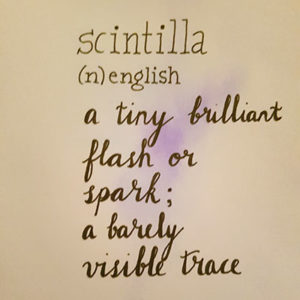 future medical expenses resulting from an incident on a DART bus. He argued that “the jury’s award of $45,000 in future medical expenses could be supported by multiplying an annual cost of $7,000 for two emergency room visits for six and one half years” Unfortunately for Gaytan: “There was no evidence, however, to show a reasonable probability Gaytan would visit the emergency room in the future, let alone twice yearly, in connection with the injuries he sustained in 2012. The only emergency room visits he made after 2012 were as a result of other accidents.” No. 05-17-00116-CV (June 1, 2018) (mem. op.)
future medical expenses resulting from an incident on a DART bus. He argued that “the jury’s award of $45,000 in future medical expenses could be supported by multiplying an annual cost of $7,000 for two emergency room visits for six and one half years” Unfortunately for Gaytan: “There was no evidence, however, to show a reasonable probability Gaytan would visit the emergency room in the future, let alone twice yearly, in connection with the injuries he sustained in 2012. The only emergency room visits he made after 2012 were as a result of other accidents.” No. 05-17-00116-CV (June 1, 2018) (mem. op.)
 In Bethel v. Quilling Selander – what is now the second (here is the first) opinion to note the distinction between “issues” and “arguments” after the Fifth Court’s March 29 en banc opinion in St. John Missionary Baptist Church v. Flakes – the Court observed: “Courts may not consider issues that were not raised in the courts below, but parties are free to construct new arguments in support of issues properly before the court. Thus, to the extent Bethel’s assertion is an argument as opposed to an issue, we address it.” (emphasis in original, citation omitted). The Court was also willing to consider a defense of attorney immunity in the context of a Rule 91 motion to dismiss, notwithstanding other intermediate Texas authority that takes a narrower focus in that procedural setting. No. 05-17-00850-CV (May 30, 2018) (mem. op.)
In Bethel v. Quilling Selander – what is now the second (here is the first) opinion to note the distinction between “issues” and “arguments” after the Fifth Court’s March 29 en banc opinion in St. John Missionary Baptist Church v. Flakes – the Court observed: “Courts may not consider issues that were not raised in the courts below, but parties are free to construct new arguments in support of issues properly before the court. Thus, to the extent Bethel’s assertion is an argument as opposed to an issue, we address it.” (emphasis in original, citation omitted). The Court was also willing to consider a defense of attorney immunity in the context of a Rule 91 motion to dismiss, notwithstanding other intermediate Texas authority that takes a narrower focus in that procedural setting. No. 05-17-00850-CV (May 30, 2018) (mem. op.)
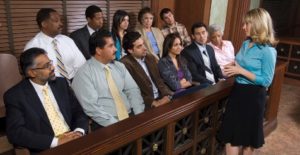 “On the morning of April 11, the . . . bus picked up Taylor’s group, the majority of whom were senior citizens, and embarked for the casino. The accident occurred soon after the bus had merged onto the President George Bush Turnpike from State Highway 161. [The driver] and Taylor disagreed over whether to continue on the turnpike, which is a paid tollway. [The driver] crashed the bus while discussing this issue with Taylor. The bus drifted onto the shoulder, struck a crash attenuator, and then veered across the road and struck a concrete barrier, after which it rolled onto its side.” The jury found that the casino was vicariously liable for Taylor’s distraction of the driver under a number of agency theories; under the deferential standard of review for a jury’s verdict, the Fifth Court affirmed. Choctaw Nation v. Sewell, No. 05-16-01011-CV (May 29, 2018) (mem. op.)
“On the morning of April 11, the . . . bus picked up Taylor’s group, the majority of whom were senior citizens, and embarked for the casino. The accident occurred soon after the bus had merged onto the President George Bush Turnpike from State Highway 161. [The driver] and Taylor disagreed over whether to continue on the turnpike, which is a paid tollway. [The driver] crashed the bus while discussing this issue with Taylor. The bus drifted onto the shoulder, struck a crash attenuator, and then veered across the road and struck a concrete barrier, after which it rolled onto its side.” The jury found that the casino was vicariously liable for Taylor’s distraction of the driver under a number of agency theories; under the deferential standard of review for a jury’s verdict, the Fifth Court affirmed. Choctaw Nation v. Sewell, No. 05-16-01011-CV (May 29, 2018) (mem. op.)
 A common issue about attorneys’ fees awards in commercial cases involves “allocation” between activity for which fees are recoverable (speaking generally, contract claims), and those for which they are not (again generally, related business tort claims. A variant of that issue appeared in Anderton v. City of Cedar Hill, in which the City recovered attorneys’ fees in a declaratory judgment dispute with property owners about permissible land use. Unfortunately for the City, the fee award proved to have a weak connection to the four pieces of property at issue in the litigation:
A common issue about attorneys’ fees awards in commercial cases involves “allocation” between activity for which fees are recoverable (speaking generally, contract claims), and those for which they are not (again generally, related business tort claims. A variant of that issue appeared in Anderton v. City of Cedar Hill, in which the City recovered attorneys’ fees in a declaratory judgment dispute with property owners about permissible land use. Unfortunately for the City, the fee award proved to have a weak connection to the four pieces of property at issue in the litigation:
- as to “Lot 4,” while the City argued that its use was a main objective of the litigation, the parties’ pleadings did not in fact make a claim about it, and the landowners voluntarily ceased to occupy it at some point during the litigation;
- as to “Lot 5,” the parties’ claims were mooted by zoning amendments that came after the majority of the fees incurred about it;
- as to “Lot 6,” while “[t]he City appears to have accomplished some, although not all, of its objectives,” “the [property owners] appear to have been largely successful in defending their use of” the lot, if not their construction on it;
- and as to “Lot 7,” the parties largely agreed upon the resolution of their issues.
Accordingly, after examining “the parties’ claims, objectives, and outcomes” about the lots, the Fifth Court concluded that a $166,000 fee award under the declaratory judgment statute was not “equitable or just.” No. 05-17-00138-CV (May 25, 2018).
 While 600Commerce does not ordinarily cover the Texas Supreme Court, the opinion in Lujan v. Navistar is of unusually broad interest to civil litigators. Navistar contended that Lujan made inconsistent statements about the ownership of a group of trucks, and that as a result, Lujan’s affidavit testimony on the point should be diregarded as a “sham.” The Texas Supreme Court agreed that this was a viable concept in state court summary judgment practice: “Most Texas courts of appeals have recognized the sham affidavit rule as a legitimate component of a trial judge’s authority under Rule 166a to grant summary judgment when no genuine issue as to any material fact exists. The rule has long been applied throughout the federal court system under Rule 56, which contains language nearly identical to Rule 166a. We agree with the majority view that a trial court’s authority to distinguish between genuine and non-genuine fact issues includes the authority to apply the sham affidavit rule when confronted with evidence that appears to be a sham designed to avoid summary judgment.” No. 16-0588 (April 27, 2018).b
While 600Commerce does not ordinarily cover the Texas Supreme Court, the opinion in Lujan v. Navistar is of unusually broad interest to civil litigators. Navistar contended that Lujan made inconsistent statements about the ownership of a group of trucks, and that as a result, Lujan’s affidavit testimony on the point should be diregarded as a “sham.” The Texas Supreme Court agreed that this was a viable concept in state court summary judgment practice: “Most Texas courts of appeals have recognized the sham affidavit rule as a legitimate component of a trial judge’s authority under Rule 166a to grant summary judgment when no genuine issue as to any material fact exists. The rule has long been applied throughout the federal court system under Rule 56, which contains language nearly identical to Rule 166a. We agree with the majority view that a trial court’s authority to distinguish between genuine and non-genuine fact issues includes the authority to apply the sham affidavit rule when confronted with evidence that appears to be a sham designed to avoid summary judgment.” No. 16-0588 (April 27, 2018).b
 A majority of the Fifth Court recently held in St. John Missionary Baptist Church v. Flakes that “construing [Tex. R. App. P] 38.9(b) to require us to identify and suggest briefing on issues not raised by an appellant would depart from our duty to be neutral and impartial.” No. 05-16-00671-CV (March 29, 2018) (en banc). As a counterpoint to that bright-line rule, in a different context, a later panel noted in American Realty Trust v. Andrews Kurth: “We cannot consider issues raised for the first time in a reply brief. But the distinction between issues and arguments is not always clear.” No. 05-16-01433-CV 05-16-01433-CV (May 8, 2018) (mem. op.) (citations omitted, quoting authorities saying that “[Appellant] was not required on appeal or at trial to rely on precisely the same case law or statutory subpart that we now find persuasive” and “We do not consider issues that were not raised in the courts below, but parties are free to construct new arguments in support of issues properly before the Court.”)
A majority of the Fifth Court recently held in St. John Missionary Baptist Church v. Flakes that “construing [Tex. R. App. P] 38.9(b) to require us to identify and suggest briefing on issues not raised by an appellant would depart from our duty to be neutral and impartial.” No. 05-16-00671-CV (March 29, 2018) (en banc). As a counterpoint to that bright-line rule, in a different context, a later panel noted in American Realty Trust v. Andrews Kurth: “We cannot consider issues raised for the first time in a reply brief. But the distinction between issues and arguments is not always clear.” No. 05-16-01433-CV 05-16-01433-CV (May 8, 2018) (mem. op.) (citations omitted, quoting authorities saying that “[Appellant] was not required on appeal or at trial to rely on precisely the same case law or statutory subpart that we now find persuasive” and “We do not consider issues that were not raised in the courts below, but parties are free to construct new arguments in support of issues properly before the Court.”)
An unfortunate domestic situation led to the issue presented in Markl v. Leake – whether a married couple could “use fiduciary law to recoup m oney [the husband] spent on making repairs to the property of a woman with whom he had a ten-year clandestine relationship.” The Fifth Court reviewed precedent and an academic commentary that observed: “Relationships, not individuals, are the prime concern of fiduciary law,” which focuses on “the degree of dependence and vulnerability that exists within” a particular relationship, as well as “the value of the interaction to the society at large.” From that foundation, the Court concluded: “Whether [the] relationship contained aspects similar to a marriage is unavailing because, in this case, [the husband] was married – to [the wife and co-plaintiff]. Recognizing [the] relationship as fiduciary in character, under the circumstances here, would make light of the very notion of the concepts of trust and confidence.” No. 05-17-00174-CV (May 14, 2018) (mem. op.)
oney [the husband] spent on making repairs to the property of a woman with whom he had a ten-year clandestine relationship.” The Fifth Court reviewed precedent and an academic commentary that observed: “Relationships, not individuals, are the prime concern of fiduciary law,” which focuses on “the degree of dependence and vulnerability that exists within” a particular relationship, as well as “the value of the interaction to the society at large.” From that foundation, the Court concluded: “Whether [the] relationship contained aspects similar to a marriage is unavailing because, in this case, [the husband] was married – to [the wife and co-plaintiff]. Recognizing [the] relationship as fiduciary in character, under the circumstances here, would make light of the very notion of the concepts of trust and confidence.” No. 05-17-00174-CV (May 14, 2018) (mem. op.)
 At trial, the judge “stated the parties did not have a contract and it was taking the quantum meruit claim under advisement ‘to make a determination as to damages.'” But the judgment awarded damages for breach of contract, and the judge then
At trial, the judge “stated the parties did not have a contract and it was taking the quantum meruit claim under advisement ‘to make a determination as to damages.'” But the judgment awarded damages for breach of contract, and the judge then  entered findings of fact and conclusions of law that “the parties operated under an express contract.” Problem? No: “[W]ritten orders or judgments control over conflicting oral pronounements. . . . [T]he trial court’s written findings supersede any oral statements.” Kaur-Gardner v. Keane Landscaping, No. 05-17-00230-CV (May 14, 2018) (mem. op.)
entered findings of fact and conclusions of law that “the parties operated under an express contract.” Problem? No: “[W]ritten orders or judgments control over conflicting oral pronounements. . . . [T]he trial court’s written findings supersede any oral statements.” Kaur-Gardner v. Keane Landscaping, No. 05-17-00230-CV (May 14, 2018) (mem. op.)
 The explosion of economic growth and suburban sprawl into once-rural Collin County has produced a complex map of cities and their extra-territorial jurisdiction. The subtleties of that map engulfed the Custer Storage Center (right), who became involved in a dispute between the County and the City of McKinney (oddly enough, the county seat) about what construction permits were required. Held: “The City lacks authority to require a
The explosion of economic growth and suburban sprawl into once-rural Collin County has produced a complex map of cities and their extra-territorial jurisdiction. The subtleties of that map engulfed the Custer Storage Center (right), who became involved in a dispute between the County and the City of McKinney (oddly enough, the county seat) about what construction permits were required. Held: “The City lacks authority to require a 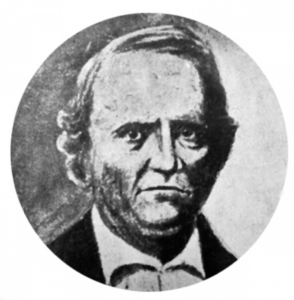 landowner developing property in its ETJ to obtain City building permits, inspections and approvals, and pay related fees. However, the City possesses authority—to the exclusion of the County—to regulate all subdivision plats and related permits for property in the City’s ETJ.” Collin County v. City of McKinney, No. 05-17-00546-CV (May 10, 2018). (Texas pioneer Collin McKinney (left), for whom both the city and county are named, would no doubt have had conflicting loyalties for this dispute.)
landowner developing property in its ETJ to obtain City building permits, inspections and approvals, and pay related fees. However, the City possesses authority—to the exclusion of the County—to regulate all subdivision plats and related permits for property in the City’s ETJ.” Collin County v. City of McKinney, No. 05-17-00546-CV (May 10, 2018). (Texas pioneer Collin McKinney (left), for whom both the city and county are named, would no doubt have had conflicting loyalties for this dispute.)
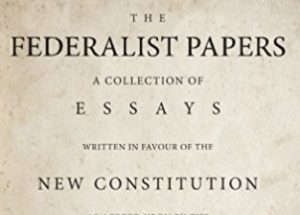 From publishing 600Camp about the Fifth Circuit, I have learned that as a result of the Erie doctrine, a substantial body of federal precedent addresses state-law issues, especially the contract and tort issues that commonly arise in homeowner wrongful foreclosure cases. Conversely, Texas courts have created a body of state authority about federal-law issues. Neither system’s intermediate court opinions bind the other, leading occasionally to a case like Osadon v. C&N Renovation Inc., in which the Dallas Court of Appeals declined to follow a Fifth Circuit opinion on a point of bankruptcy law, concluding (along with several other courts outside the Circuit) that the text of the relevant Code section dictated a different result. No. 05-17-00453-CV (May 9, 2018) (mem. op.)
From publishing 600Camp about the Fifth Circuit, I have learned that as a result of the Erie doctrine, a substantial body of federal precedent addresses state-law issues, especially the contract and tort issues that commonly arise in homeowner wrongful foreclosure cases. Conversely, Texas courts have created a body of state authority about federal-law issues. Neither system’s intermediate court opinions bind the other, leading occasionally to a case like Osadon v. C&N Renovation Inc., in which the Dallas Court of Appeals declined to follow a Fifth Circuit opinion on a point of bankruptcy law, concluding (along with several other courts outside the Circuit) that the text of the relevant Code section dictated a different result. No. 05-17-00453-CV (May 9, 2018) (mem. op.)
 The trial court found an oral contract to sell Xena, an “elite-pedigreed female Labrador retriever,” finding that the plaintiff established the partial-performance exception to the statute of frauds. .” The appellant challenged that conclusion, arguing that “his own partial performance is not ‘unequivocally referable’ to the contract to sell Xena . . . his leaving Xena with the [other side] in July 2013 is equally consistent with his prior conduct of leaving a dog with [them] for training.” The Fifth Court disagreed, observing: “[I]t is not [Appellant’s] partial performance that is at issue; instead, it is [Appellees’] performance, which was established by their testimony and their documentary evidence . . . Partial performance takes a contract out of the statute of frauds when the party seeking enforcement of the contract partially performed.” McCain v. Promise House, No. 05-16-00598-CV (May 7, 2018) (mem. op.)
The trial court found an oral contract to sell Xena, an “elite-pedigreed female Labrador retriever,” finding that the plaintiff established the partial-performance exception to the statute of frauds. .” The appellant challenged that conclusion, arguing that “his own partial performance is not ‘unequivocally referable’ to the contract to sell Xena . . . his leaving Xena with the [other side] in July 2013 is equally consistent with his prior conduct of leaving a dog with [them] for training.” The Fifth Court disagreed, observing: “[I]t is not [Appellant’s] partial performance that is at issue; instead, it is [Appellees’] performance, which was established by their testimony and their documentary evidence . . . Partial performance takes a contract out of the statute of frauds when the party seeking enforcement of the contract partially performed.” McCain v. Promise House, No. 05-16-00598-CV (May 7, 2018) (mem. op.)
 Rhymes sued Maria Hernandez for injuries arising from a car accident. Hernandez ultimately defaulted. During the course of the proceedings, “Rhymes’ attorney was also communicating with [United Automobile Insurance Services, a claims-handling service] about the accident and attempting to settle his personal injury claim . . . . UAIS made several unsuccessful attempts to contact [the insured parties] about the matter before the default judgment was signed.” As to notice, “[t]he evidence established that [Hernandez] never gave notice of suit to or requested a defense from UAIS or Old American [Insurance Company].”
Rhymes sued Maria Hernandez for injuries arising from a car accident. Hernandez ultimately defaulted. During the course of the proceedings, “Rhymes’ attorney was also communicating with [United Automobile Insurance Services, a claims-handling service] about the accident and attempting to settle his personal injury claim . . . . UAIS made several unsuccessful attempts to contact [the insured parties] about the matter before the default judgment was signed.” As to notice, “[t]he evidence established that [Hernandez] never gave notice of suit to or requested a defense from UAIS or Old American [Insurance Company].”
Rhymes then sued to collect on Hernandez’s policy. The Fifth Court reversed a summary judgment in his favor and rendered judgment for the defendants, finding that notice was a condition precedent to coverage under the policy, and rejecting two arguments made by Rhymes about the practicalities of the situation:
- “Rhymes also argues that the notice of suit provision was actually satisfied here because his attorney sent appellants copies of the petition in the underlying suit and confirmation of service on Maria. . . . Notice given by a third party does not trigger the insurer’s duty to defend and does not estop the insurer from asserting the insured’s breach as a bar to liability.”
- And as to prejudice, while the defendants’ “claim file relating to the accident showed that appellants viewed coverage as ‘clear’ and liability as ‘accepted,'” the default judgment established prejudice as a matter of law, as it “not only deprived appellants of the opportunity to litigate the claim’s merits but also imposed ‘a new burden of proof on new issues’ in order to set the default judgment aside.”
United Automobile Insurance Services v. Rhymes, 05-16-01125-CV (May 4, 2018) (mem. op.)
 After a detour to Austin on an important but infrequent procedural issue, the Fifth Court turned to the merits of Pak v. Ad Villarai LLC; holding as follows on the issue of whether Pak was properly removed from his management positions:
After a detour to Austin on an important but infrequent procedural issue, the Fifth Court turned to the merits of Pak v. Ad Villarai LLC; holding as follows on the issue of whether Pak was properly removed from his management positions:
The evidence showed written notice was given three days after the action removing Pak as member and co-manager. The notice was given to both Pak and Harrison. Both had full knowledge, yet the testimony at trial showed neither objected. In his reply brief, Pak complains the consent was taken while the two sides were in litigation against each other, so there “was no way the Trial Court should have reasoned Chan Pak would have consented from being removed” from Villas-Manager by appellees. Pak does not provide any legal authority to support his position, nor can we agree that (1) the statute does not apply if the parties are in litigation or (2) the trial court was required to guess at Pak’s reasons for failing to object. Nothing on the face of the statute requires either. Under section 101.359 of the business organizations code, Pak and Harrison’s consent to Pak’s removal as co-manager was established by their failure to object.
No. 05-14-01312-CV (May 5, 2018) (mem. op.)
 Assuming arguendo – a considerable assumption given recent opinions on the point – that “manifest disregard of the law” is a viable challenge to an arbitration award, it did not apply even to a threshold issue such as standing when: “The parties agree that the arbitrator heard evidence and argument offered by both parties on the question of Sricom’s capacity to recover on its counterclaim. This evidence included Sricom’s certificate of authority to do business in Texas, the parties’ contract, and evidence of the parties’ alleged breaches and when those breaches occurred. The arbitrator’s acceptance of Sricom’s arguments and evidence instead of C Tekk’s, even if erroneous, was not manifest disregard of the law.” C Tekk Solutions, Inc. v. Sricom, Inc., No. 05-17-00845-CV (May 1, 2018) (mem. op.)
Assuming arguendo – a considerable assumption given recent opinions on the point – that “manifest disregard of the law” is a viable challenge to an arbitration award, it did not apply even to a threshold issue such as standing when: “The parties agree that the arbitrator heard evidence and argument offered by both parties on the question of Sricom’s capacity to recover on its counterclaim. This evidence included Sricom’s certificate of authority to do business in Texas, the parties’ contract, and evidence of the parties’ alleged breaches and when those breaches occurred. The arbitrator’s acceptance of Sricom’s arguments and evidence instead of C Tekk’s, even if erroneous, was not manifest disregard of the law.” C Tekk Solutions, Inc. v. Sricom, Inc., No. 05-17-00845-CV (May 1, 2018) (mem. op.)
A clean example of mootness appears in Tru Exploration LLC v. Energy Exploration I LLC: “The dispute on appeal centers on whether arbitration is required. Arbitration having been conducted and an award having been issued, the controversy no longer exists and the appeal is moot.” No. 05-15-00217-CV (April 27, 2018) (mem. op.) (applying Trulock v. City of Duncanville, 277 S.W.3d 920, 923 (Tex. App.–Dallas 2009, no pet.).
 In the context of affirming a grant of summary judgment for the defendants in a dispute about a commercial real estate development, the Fifth Court observed: “The elements of a joint venture are (1) an express or implied agreement to engage in a joit venture, (2) a community of interest in the venture, (3) an agreement to share profits and losses from the enterprise, and (4) a mutual right of control or management of the enterprise. First United Pentecostal Church of Beaumont v. Parker, 514 S.W.3d 214, 225 (Tex. 2017). Joint venturere owe fiduciary duties to each other. Kirby v. Cruce, 688 S.W.2d 161, 165 (Tex. App.–Dallas 1985, writ ref’d n.r.e.).” Tin Star Development LLC v. 360 Residential LLC, No. 05-17-00040-CV (April 17, 2018) (mem. op.)
In the context of affirming a grant of summary judgment for the defendants in a dispute about a commercial real estate development, the Fifth Court observed: “The elements of a joint venture are (1) an express or implied agreement to engage in a joit venture, (2) a community of interest in the venture, (3) an agreement to share profits and losses from the enterprise, and (4) a mutual right of control or management of the enterprise. First United Pentecostal Church of Beaumont v. Parker, 514 S.W.3d 214, 225 (Tex. 2017). Joint venturere owe fiduciary duties to each other. Kirby v. Cruce, 688 S.W.2d 161, 165 (Tex. App.–Dallas 1985, writ ref’d n.r.e.).” Tin Star Development LLC v. 360 Residential LLC, No. 05-17-00040-CV (April 17, 2018) (mem. op.)
 At a recent energy law seminar for the University of Texas, My colleagues Michael Hurst, Jonathan Childers, and Jervonne Newsome presented this excellent paper on the important and recurring topic of maintaining attorney-client privilege in communications involving in-house counsel – a constant challenge given the many hats worn by legal counsel in the modern business environment.
At a recent energy law seminar for the University of Texas, My colleagues Michael Hurst, Jonathan Childers, and Jervonne Newsome presented this excellent paper on the important and recurring topic of maintaining attorney-client privilege in communications involving in-house counsel – a constant challenge given the many hats worn by legal counsel in the modern business environment.
 Tex. R. Evid. 503(d)(2), a long-lived but rarely-cited exception to the attorney-client privilege, applies “[i]f the communication is relevant to an issue between parties claiming through the same deceased client.” In In re: Rittenmeyer, the Fifth Court declined to grant mandamus relief as against an order to produce documents pursuant to this exemption, finding that – like the handful of other cases that have allowed such discovery – the case “involves a dispute between a decedent’s estate and a party who claims to be a beneficiary under the estate either through a subsequent will or because the probated will does not reflect the decedent’s intentions.” No. 05-17-01378-CV (April 18, 2017) (mem. op.)
Tex. R. Evid. 503(d)(2), a long-lived but rarely-cited exception to the attorney-client privilege, applies “[i]f the communication is relevant to an issue between parties claiming through the same deceased client.” In In re: Rittenmeyer, the Fifth Court declined to grant mandamus relief as against an order to produce documents pursuant to this exemption, finding that – like the handful of other cases that have allowed such discovery – the case “involves a dispute between a decedent’s estate and a party who claims to be a beneficiary under the estate either through a subsequent will or because the probated will does not reflect the decedent’s intentions.” No. 05-17-01378-CV (April 18, 2017) (mem. op.)
 After rejecting the novel, but problematic, argument that a corporation chartered outside Texas could not invoke the Texas longarm statute, the Fifth Court found personal jurisdiction over a Louisiana car dealer that sold retail installment contracts to a Dallas-based financial business. The Court proceeded in three distinct steps, in a framework that helps impose order on recent changes in personal jurisdiction law. First, it evaluated minimum contacts for constitutional due process requirements (considering (1) only the defendant’s contacts with the forum, (2) acts that are “purposeful” rather than fortuitous, and (3) whether the defendant sought some benefit, advantage, or profit by “availing” itself of Texas); second, it examined the “relationship among the defendant, the forum[,] and the litigation” to determine whether specific jurisdiction was appropriate; and third, it reviewed whether fair play and substantial justice was satisfied. Winnsboro Auto Ventures LLC v. Santander Consumer USA, No. 05-17-00895-CV (April 19, 2018).
After rejecting the novel, but problematic, argument that a corporation chartered outside Texas could not invoke the Texas longarm statute, the Fifth Court found personal jurisdiction over a Louisiana car dealer that sold retail installment contracts to a Dallas-based financial business. The Court proceeded in three distinct steps, in a framework that helps impose order on recent changes in personal jurisdiction law. First, it evaluated minimum contacts for constitutional due process requirements (considering (1) only the defendant’s contacts with the forum, (2) acts that are “purposeful” rather than fortuitous, and (3) whether the defendant sought some benefit, advantage, or profit by “availing” itself of Texas); second, it examined the “relationship among the defendant, the forum[,] and the litigation” to determine whether specific jurisdiction was appropriate; and third, it reviewed whether fair play and substantial justice was satisfied. Winnsboro Auto Ventures LLC v. Santander Consumer USA, No. 05-17-00895-CV (April 19, 2018).
 In a thorough review of sovereign immunity principles, the Fifth Court granted a mandamus petition and found that ERCOT was protected from claims that it misrepresented information about future demand for electric power in Texas. ERCOT v. Panda Power Generation, No. 05-17-00872-CV (April 16, 2018) (applying, inter alia,Brown & Gay v. Olivares, 461 S.W.3dd 117 (Tex. 2015)). Notably, in its discussion of mandamus standards, after noting that a trial court lacks discretion to misapply the law, the Court observed: “This principle applies even when the law is unsettled.” (citing In re: J.B. Hunt Transport, Inc., 492 S.W.3d 287, 294 (Tex 2016) (orig. proceeding).
In a thorough review of sovereign immunity principles, the Fifth Court granted a mandamus petition and found that ERCOT was protected from claims that it misrepresented information about future demand for electric power in Texas. ERCOT v. Panda Power Generation, No. 05-17-00872-CV (April 16, 2018) (applying, inter alia,Brown & Gay v. Olivares, 461 S.W.3dd 117 (Tex. 2015)). Notably, in its discussion of mandamus standards, after noting that a trial court lacks discretion to misapply the law, the Court observed: “This principle applies even when the law is unsettled.” (citing In re: J.B. Hunt Transport, Inc., 492 S.W.3d 287, 294 (Tex 2016) (orig. proceeding).
 This is an example of an admission of fact, not a legal conclusion: “That the Commercial Truck suffered engine failure in Dallas, Texas and Plaintiff retained Defendants’ [sic] to rebuild the engine and perform additional repairs.” Garcha v. Chatha, No. 05-17-00084-CV (Apr. 12, 2018) (mem. op.)
This is an example of an admission of fact, not a legal conclusion: “That the Commercial Truck suffered engine failure in Dallas, Texas and Plaintiff retained Defendants’ [sic] to rebuild the engine and perform additional repairs.” Garcha v. Chatha, No. 05-17-00084-CV (Apr. 12, 2018) (mem. op.)
 The Judah family owned three lots in DeSoto, near a busy highway and a church. Over the years, as the property changed hands and the church grew, access problems developed between the property and the highway. During a 2007 expansion of a parking lot, as part of acquiring a road previous owned by the city, the church:
The Judah family owned three lots in DeSoto, near a busy highway and a church. Over the years, as the property changed hands and the church grew, access problems developed between the property and the highway. During a 2007 expansion of a parking lot, as part of acquiring a road previous owned by the city, the church:
“. . . signed a new amended plat for the property that showed he abandoned roadway and specifically outlined utility easements. The Owners Certificate attached to the plat described the easements being granted to the public utilities in detail. On the front of the plat was a notation stating, ‘NOTE: A Blanket Ingress/Egress Easement is granted across Lot 1A, Block 4 of this plat [the church’s property] to 168 Church Street [one of the Judah lots].”
In subsequent litigation about access to that lot, The Fifth Court found that this language was insufficient to establish an express easement or an easement by estoppel, and affirmed summary judgment for the church. Sandoval v. Community Missionary Baptist Church, 05-17-00456-CV (April 13, 2018) (mem. op.)
 Stephens slipped and fell outside a Wal-Mart. He sued, Wal-Mart sought summary judgment based on his admissions about the cause of his fall, and Stephens then asked for a continuance to conduct more discovery. The Fifth Court affirmed judgment for Wal-Mart, observing that Stephens’s continuance motion (1) “does not identify any evidence he is seeking to discovery that would make his case an exception to th[e] rule” that a premises owner is not liable for injury caused by natural accumulation of precipitation, and (2) “fails to explain why he did not seek to take any depositions in the two months” between the designation of Wal-Mart’s knowledgeable employees and the summary judgment hearing, other than an “unsubstantiated reference to his counsel’s ‘litigation schedule.'” Stephens v. Wal-Mart Stores, No. 05-17-00434-CV (Apr. 11, 2018) (mem. op.)
Stephens slipped and fell outside a Wal-Mart. He sued, Wal-Mart sought summary judgment based on his admissions about the cause of his fall, and Stephens then asked for a continuance to conduct more discovery. The Fifth Court affirmed judgment for Wal-Mart, observing that Stephens’s continuance motion (1) “does not identify any evidence he is seeking to discovery that would make his case an exception to th[e] rule” that a premises owner is not liable for injury caused by natural accumulation of precipitation, and (2) “fails to explain why he did not seek to take any depositions in the two months” between the designation of Wal-Mart’s knowledgeable employees and the summary judgment hearing, other than an “unsubstantiated reference to his counsel’s ‘litigation schedule.'” Stephens v. Wal-Mart Stores, No. 05-17-00434-CV (Apr. 11, 2018) (mem. op.)
 In several situations, Texas procedure gives pleadings evidentiary effect instead of treating them only as a means of notice; a basic one is illustrated by the FED dispute in Trans Am SFE II LLC v. Young: “To prove its case, Trans Am needed to show (1) a trustee’s deed or substitute trustee’s deed from the foreclosure sale demonstrating it purchased the property at the foreclosure sale, (2) that appellees would become tenants at sufferance following the foreclosure sale if they did not vacate, and (3) notice to vacate informing appellees of their tenant at sufferance position and the need to vacate the property. Each of these elements was alleged in Trans Am’s petition thereby conferring jurisdiction on the justice court and the county court at law to hear the case.” (citations omitted). Accordingly, the plaintiff did not have to substantiate these allegations with evidence unless the defendant first brought forward evidence to contradict them. No. 05-17-00394-CV (Apr. 6, 2018) (mem. op.)
In several situations, Texas procedure gives pleadings evidentiary effect instead of treating them only as a means of notice; a basic one is illustrated by the FED dispute in Trans Am SFE II LLC v. Young: “To prove its case, Trans Am needed to show (1) a trustee’s deed or substitute trustee’s deed from the foreclosure sale demonstrating it purchased the property at the foreclosure sale, (2) that appellees would become tenants at sufferance following the foreclosure sale if they did not vacate, and (3) notice to vacate informing appellees of their tenant at sufferance position and the need to vacate the property. Each of these elements was alleged in Trans Am’s petition thereby conferring jurisdiction on the justice court and the county court at law to hear the case.” (citations omitted). Accordingly, the plaintiff did not have to substantiate these allegations with evidence unless the defendant first brought forward evidence to contradict them. No. 05-17-00394-CV (Apr. 6, 2018) (mem. op.)
 As to the need to object to summary judgment evidentiary rulings – not the evidence itself – the current state of the law in Dallas is as follows: “Prior panel decisions of this Court suggest that when a party fails to object to the trial court’s ruling that sustains an objection to his summary judgment evidence, he has not preserved the right to complain on appeal about the trial court’s ruling. See Brooks v. Sherry Lane Nat’l Bank, 788 S.W.2d 874, 878 (Tex. App.—Dallas 1990, no writ). We are aware that this holding has come under criticism recently. See Miller v. Great Lakes Mgmt. Serv., Inc., No. 02-16-00087-CV, 2017 WL 1018592, at *2 n.4 (Tex. App.—Fort Worth Mar. 16, 2017, no pet.) (mem. op.). Absent a decision from a higher court or this Court sitting en banc that is on point, this Court is bound by the prior holdings of other panels of this Court.” Du Bois v. Martin Luther King Jr. Family Clinic, No. 05-16-01460-CV (April 5, 2018) (mem. op.)
As to the need to object to summary judgment evidentiary rulings – not the evidence itself – the current state of the law in Dallas is as follows: “Prior panel decisions of this Court suggest that when a party fails to object to the trial court’s ruling that sustains an objection to his summary judgment evidence, he has not preserved the right to complain on appeal about the trial court’s ruling. See Brooks v. Sherry Lane Nat’l Bank, 788 S.W.2d 874, 878 (Tex. App.—Dallas 1990, no writ). We are aware that this holding has come under criticism recently. See Miller v. Great Lakes Mgmt. Serv., Inc., No. 02-16-00087-CV, 2017 WL 1018592, at *2 n.4 (Tex. App.—Fort Worth Mar. 16, 2017, no pet.) (mem. op.). Absent a decision from a higher court or this Court sitting en banc that is on point, this Court is bound by the prior holdings of other panels of this Court.” Du Bois v. Martin Luther King Jr. Family Clinic, No. 05-16-01460-CV (April 5, 2018) (mem. op.)
Masa Custom Homes LLC v. Shahin arose from the untimely death of Dallas district judge Phyllis Lister Brown; before her passing, she had heard the evidence in a bench trial, indicated her rulings by mail, and held a hearing on the appropriate form of judgment. But because she died before entering judgment, another judge signed the final judgment in the matter. The Fifth Court found that judgment void: :All courts that have addressed the issue directly have held the rules of civil procedure do not authorize a judge to render judgment following a bench trial unless he personally heard the evidence on which the judgment is based.” No. 05-16-00978-CV (April 2, 2018) (applying, inter alia, Ad Villarai LLC v. Chan Pak, 519 S.W.3d 132 (Tex. 2017)).
A series of adverse discovery rulings can be frustrating. But seeking recusal based on such rulings is likely a step too far: “Pettigrew contends that the trial court’s orders with respect to Bell’s deposition show that the trial court was advocating for Bell and was biased in favor of Bell and against him. Pettigrew cites no authority to support his contention that these types of discovery rulings constitute bias by the trial judge. Judicial rulings alone almost never constitute a valid basis for a bias or partiality motion.” Pettigrew v. Cedar Springs Alexandre’s Bar, No. 05-16-00269-CV (April 2, 2018) (mem. op.) (applying Hansen v. JP Morgan Chase Bankm 346 S.W.3d 769, 776 (Tex. App.–Dallas 2011, no pet.)
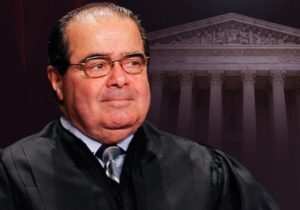 In a rare en banc decision, a majority of Fifth Court justices held in St. John Missionary Baptist Church v. Flakes that “construing [Tex. R. App. P] 38.9(b) to require us to identify and suggest briefing on issues not raised by an appellant would depart from our duty to be neutral and impartial.” Thus, in the case before it: “Because appellants fail to challenge all grounds upon which the trial court could have granted appellees’ amended motion to dismiss and plea to the jurisdiction, we have no discretion to do anything other than to accept the validity of the unchallenged ground.” Two dissents countered that “where the parties have in fact preserved the issues below, timely appealed, and identified the issues for a decision on appeal, a brief that fails to adequately cite to authority or the record, or that omits an argument that is deemed to be included in the trial court’s disposition of the issue, should not be fatal to the appeal. Instead, that deficiency simply amounts to ‘a failure to properly present the case on the briefs’ and affords the court a number of efficient options under the rules.” No. 05-16-00671-CV (March 29, 2018).
In a rare en banc decision, a majority of Fifth Court justices held in St. John Missionary Baptist Church v. Flakes that “construing [Tex. R. App. P] 38.9(b) to require us to identify and suggest briefing on issues not raised by an appellant would depart from our duty to be neutral and impartial.” Thus, in the case before it: “Because appellants fail to challenge all grounds upon which the trial court could have granted appellees’ amended motion to dismiss and plea to the jurisdiction, we have no discretion to do anything other than to accept the validity of the unchallenged ground.” Two dissents countered that “where the parties have in fact preserved the issues below, timely appealed, and identified the issues for a decision on appeal, a brief that fails to adequately cite to authority or the record, or that omits an argument that is deemed to be included in the trial court’s disposition of the issue, should not be fatal to the appeal. Instead, that deficiency simply amounts to ‘a failure to properly present the case on the briefs’ and affords the court a number of efficient options under the rules.” No. 05-16-00671-CV (March 29, 2018).
The majority opinion was written by Justice Evans, joined by Chief Justice Wright and Justices Francis, Lang, Lang-Miers, Brown, Stoddart, and Whitehill. The dissenters were Justices Schenck, Bridges, Fillmore, Myers, and Boatright (who also wrote a separate, individual dissent). The division of opinion in this case offers a rare insight on how the viewpoints of the Justices compare on a waiver issue; a general topic frequently addressed by the Fifth Court in a variety of different settings.
 A significant challenge in professional liability cases involving litigation is proving the “case in a case” – what the outcome should have been in the relevant lawsuit, absent the alleged malpractice. In Haddock v. Gruber, the Fifth Court addressed the collateral estoppel effect of an earlier judgment in a complex series of cases, concluding that it precluded the proof of the necessary “case in a case.” The opinion addresses both the elements of collateral estoppel in this context and several policy-based attacks on the use of the doctrine in this setting. No. 05-16-1113-CV (March 22, 2018) (mem. op.)
A significant challenge in professional liability cases involving litigation is proving the “case in a case” – what the outcome should have been in the relevant lawsuit, absent the alleged malpractice. In Haddock v. Gruber, the Fifth Court addressed the collateral estoppel effect of an earlier judgment in a complex series of cases, concluding that it precluded the proof of the necessary “case in a case.” The opinion addresses both the elements of collateral estoppel in this context and several policy-based attacks on the use of the doctrine in this setting. No. 05-16-1113-CV (March 22, 2018) (mem. op.)
 In a dispute about alleged undue influence on a Texas-based testator, in the context of evaluating the totality of the defendants’ contacts with Texas, the Fifth Court identified several Texas contacts that will not ordinarily establish personal jurisdiction:
In a dispute about alleged undue influence on a Texas-based testator, in the context of evaluating the totality of the defendants’ contacts with Texas, the Fifth Court identified several Texas contacts that will not ordinarily establish personal jurisdiction:
- Written communications in Texas, and personal visits to Texas, when no evidence “establishes what was said in any particular disputed conversation”;
- Simply being named in estate planning documents in a contingent position, when “none of those contingency appointments ever occurred” so the party “did not accept any benefits or obligations or take any action in any of these capacities”; and
- For alter ego, simply the “[f]ailure to observe corporate formalities” or the owner’s “taking a draw” from the company.
Karaa v. Aramoonie, No. 05-17-00571-CV (March 19, 2018).
 The case of Starwood Management v. Swaim returned to the Fifth Court, after a reversal and remand by the Texas Supreme Court. The previous Fifth Court opinion affirmed a defense summary judgment, finding that the affidavits of the plaintiffs’ causation experts in a legal malpractice were conclusory. The Texas Supreme Court held otherwise. Against that backdrop, on remand, the Fifth Court found that the affidavits were not “speculative” (a concept arguably distinct from being “conclusory”) and was relevant, and reversed the summary judgment that had resulted from these rulings and the one addressed by the supreme court. No. 05-14-01218-CV (March 20, 2018) (mem. op.)
The case of Starwood Management v. Swaim returned to the Fifth Court, after a reversal and remand by the Texas Supreme Court. The previous Fifth Court opinion affirmed a defense summary judgment, finding that the affidavits of the plaintiffs’ causation experts in a legal malpractice were conclusory. The Texas Supreme Court held otherwise. Against that backdrop, on remand, the Fifth Court found that the affidavits were not “speculative” (a concept arguably distinct from being “conclusory”) and was relevant, and reversed the summary judgment that had resulted from these rulings and the one addressed by the supreme court. No. 05-14-01218-CV (March 20, 2018) (mem. op.)
 The Fifth Court reversed and rendered default judgment for the plaintiff in a case about an allegedly stolen 2007 Bentley. As for liability, the opinion recites a useful set of deemed admissions for such a case, that could readily be adapted to other conversion-type claims. As for damages, while the plaintiff’s affidavit was found to be conclusory: “[E]videnc of the price paid may be offered as proof of the property’s fair market value. The undisputed evidence established that Swarovski paid Enger $75,500 for the Bentley on September 21, 2013, only three months before Enger took the car. [And i]n deemed admissions, Enger admitted he accepted Swarovski’s $75,500 check as full payment for the Bentley and deposited the check into his account. Thus, the undisputed evidence established that Swarovski’s damages resulting from the theft totaled $79,249.70, which includes the cost of the [car’s] rims and insurance payments.” Swarovski v. Enger, No. 05-17-00398-CV (March 16, 2018) (mem. op.)
The Fifth Court reversed and rendered default judgment for the plaintiff in a case about an allegedly stolen 2007 Bentley. As for liability, the opinion recites a useful set of deemed admissions for such a case, that could readily be adapted to other conversion-type claims. As for damages, while the plaintiff’s affidavit was found to be conclusory: “[E]videnc of the price paid may be offered as proof of the property’s fair market value. The undisputed evidence established that Swarovski paid Enger $75,500 for the Bentley on September 21, 2013, only three months before Enger took the car. [And i]n deemed admissions, Enger admitted he accepted Swarovski’s $75,500 check as full payment for the Bentley and deposited the check into his account. Thus, the undisputed evidence established that Swarovski’s damages resulting from the theft totaled $79,249.70, which includes the cost of the [car’s] rims and insurance payments.” Swarovski v. Enger, No. 05-17-00398-CV (March 16, 2018) (mem. op.)
 Confusion over which entity named “Whoa” received a property conveyance led to an argument that capacity had not properly been pleaded as a defense under Tex. R. Civ. P. 93. The Fifth Circuit disagreed with the appellants’ position: “[T]he case before us does not involve a party’s contention that its opponent is not a proper party or that a claim filed by its opponent belongs to another. . . . Further, the record does not show [Appellees] challenged Whoa’s ‘authority’ respecting its claim.” Whoa USA, Inc. v. Regan Properties, LLC, No. 05-16-01283-CV (March 12, 2018) (mem. op.)
Confusion over which entity named “Whoa” received a property conveyance led to an argument that capacity had not properly been pleaded as a defense under Tex. R. Civ. P. 93. The Fifth Circuit disagreed with the appellants’ position: “[T]he case before us does not involve a party’s contention that its opponent is not a proper party or that a claim filed by its opponent belongs to another. . . . Further, the record does not show [Appellees] challenged Whoa’s ‘authority’ respecting its claim.” Whoa USA, Inc. v. Regan Properties, LLC, No. 05-16-01283-CV (March 12, 2018) (mem. op.)
 The parties’ arbitration clause said that, after a three-arbitrator panel was selected, the arbitrators “shall hold a hearing and make an award within sixty (60) days of the filing for arbitration.” The panel issued a “Partial Final Award” within sixty days and a complete award later; the trial court found the final award was untimely and declined to confirm it. The Fifth Court found that the agreement only required “an award,” not a final award, and that the arbitration panel had the last word on the issue because the parties had incorporated AAA ruled, which give “[t]he arbitrator . . . the power to rule on his or her own jurisdiction . . . ” Signature Pharmaceuticals LLC v. Ranbaxy, Inc., No. 05-17-00412-CV (March 12, 2018) (mem. op.)
The parties’ arbitration clause said that, after a three-arbitrator panel was selected, the arbitrators “shall hold a hearing and make an award within sixty (60) days of the filing for arbitration.” The panel issued a “Partial Final Award” within sixty days and a complete award later; the trial court found the final award was untimely and declined to confirm it. The Fifth Court found that the agreement only required “an award,” not a final award, and that the arbitration panel had the last word on the issue because the parties had incorporated AAA ruled, which give “[t]he arbitrator . . . the power to rule on his or her own jurisdiction . . . ” Signature Pharmaceuticals LLC v. Ranbaxy, Inc., No. 05-17-00412-CV (March 12, 2018) (mem. op.)
 The plaintiffs in Sky Group LLC v. Vega Street I, LLC sued for conversion, and showed in their motion for summary judgment that they “contracted with Sky Group for property management services and, in the course of those services, Sky Group acquired possession of funds, documents, and keys belonging to [them]. After [they] terminated the contract, they demanded the return of the property, but the property was not returned.” Unfortunately, however, “[t]he mere failure by the defendant to deliver the property after a demand is generally not sufficient to prove an affirmative refusal. To be liable for conversion, a person must intend to assert some right in the property.” (citations omitted). The Fifth Court thus reversed summary judgment on this claim, along with several other related business tort claims. No. 05-17-00161-CV (March 5, 2018) (mem. op.)
The plaintiffs in Sky Group LLC v. Vega Street I, LLC sued for conversion, and showed in their motion for summary judgment that they “contracted with Sky Group for property management services and, in the course of those services, Sky Group acquired possession of funds, documents, and keys belonging to [them]. After [they] terminated the contract, they demanded the return of the property, but the property was not returned.” Unfortunately, however, “[t]he mere failure by the defendant to deliver the property after a demand is generally not sufficient to prove an affirmative refusal. To be liable for conversion, a person must intend to assert some right in the property.” (citations omitted). The Fifth Court thus reversed summary judgment on this claim, along with several other related business tort claims. No. 05-17-00161-CV (March 5, 2018) (mem. op.)
 After a hearing on your special appearance, the judge says “Denied.” Can you appeal? No: “An oral rendition is not sufficient. The appellate timetable runs from the date an appealable written judgment or order is signed. See TEX. R. APP. P. 26.1; Farmer v. Ben E. Keith Co., 907 S.W.2d 495, 496 (Tex. 1995).” Effel v. Rosberg, No. 05-17-01332-CV (March 6, 2018) (mem. op.)
After a hearing on your special appearance, the judge says “Denied.” Can you appeal? No: “An oral rendition is not sufficient. The appellate timetable runs from the date an appealable written judgment or order is signed. See TEX. R. APP. P. 26.1; Farmer v. Ben E. Keith Co., 907 S.W.2d 495, 496 (Tex. 1995).” Effel v. Rosberg, No. 05-17-01332-CV (March 6, 2018) (mem. op.)
 The primary results are in, and the November ballot for the eight open slots on the Fifth Court will be as follows. (The Texas Lawbook recently analyzed the election and the unusually large number of contested seats).
The primary results are in, and the November ballot for the eight open slots on the Fifth Court will be as follows. (The Texas Lawbook recently analyzed the election and the unusually large number of contested seats).
Chief Justice: Doug Lang (R) v. Robert Burns (D)
Place 2: David Evans (R) v. Robbie Partida-Kipness (D)
Place 5: Craig Stoddart (R) v. Erin Nowell (D)
Place 9: Jason Boatright (R) v. Bill Pedersen (D)
Place 10: Molly Francis (R) v. Amanda Reichek (D)
Place 11:John Browning (R) v. Cory Carlyle (D)
Place 12: Winner of runoff between Jim Pikl and William “Randy” Johnson (R) v. Ken Molberg (D)
Place 13: Elizabeth Lang-Miers (R) v. Leslie Lester Osborne (D)
 As a counterpoint to its recent discovery-limiting opinion in In re: Hanover Lloyds, the Fifth Court recently addressed three dimensions of discovery requests in a suit against the NCAA about head injuries, concluding:
As a counterpoint to its recent discovery-limiting opinion in In re: Hanover Lloyds, the Fifth Court recently addressed three dimensions of discovery requests in a suit against the NCAA about head injuries, concluding:
- Requests about other types of head injuries were overly broad, especially given the NCAA’s commitment to search for documents about “concussive and sub-concussive blows to the head” without limiting its search to those precise terms;
- The 50-year scope of discovery was reasonable in light of the types of injuries alleged and the issues about the NCAA’s awareness of them;
- Information about other sports was also discoverbale, as the issue was the NCAA’s awareness about the type of head injury in question – “. . . the injury, not the sport, is the proper inquiry.”
In re: NCAA, No. 05-17-00951-CV (March 1, 2018).
 Continuing to provide practical guidance about discovery requests (see In re: Sting Soccer Group, 2017), and applying the recent Texas Supreme Court cases about discovery of information about other claims, in the context of a dispute over one claim (see In re: Nat’l Lloyds I, 449 S.W.3d 486 (Tex. 2014), and In re: Nat’l Lloyds II, 507 S.W.3d 219 (Tex. 2016)), the Fifth Court addressed these discovery requests in an insurance claim dispute:
Continuing to provide practical guidance about discovery requests (see In re: Sting Soccer Group, 2017), and applying the recent Texas Supreme Court cases about discovery of information about other claims, in the context of a dispute over one claim (see In re: Nat’l Lloyds I, 449 S.W.3d 486 (Tex. 2014), and In re: Nat’l Lloyds II, 507 S.W.3d 219 (Tex. 2016)), the Fifth Court addressed these discovery requests in an insurance claim dispute:
(1) the last twenty-five Haag Engineering reports on a storm damage claim in Texas for one of its insureds that Hanover Lloyds Insurance Company had received before August 31, 2015 (the date of its decision letter in this case) plus the decision letters in those claims. . . .
(2) the last twenty-five Haag Engineering reports on a storm damage claim in Texas for one of its insureds that Hanover Lloyds Insurance Company had received after August 31, 2015 (the date of its decision letter in this case) plus the decision letters in those claims.
It granted mandamus relief against an order to respond to them, reasoning: “[A]ccording to Indoor Sports, it is seeking the information to develop and prove the relationship between Hanover and HAAG, Hanover’s reliance on HAAG’s training, investigation and reports, and the unreasonableness of the investigation and decision made by Hanover in light of the HAAG report and lack of contradictory evidence. Although there is a remote possibility the requested discovery could lead to the discovery of relevant evidence, we fail to see how Hanover’s use of HAAG engineering reports on claims of unrelated third parties is probative of Hanover’s conduct with respect to its handling of this claim.” In re: Hanover Lloyds, No. 05-17-00608-CV (March 2, 2018) (mem. op.)
 Archimedes famously said about the lever: “Give me a place to stand and I shall move the world!” Similarly, in review of a mandamus petition about enforcement of a foreign selection clause, the respondent only needs one place to stand: “The trial court denied the motion to dismiss and denied relators’ motion for reconsideration without stating on which grounds it denied the motions. In their petition for writ of mandamus, relators address only six of the seven grounds raised by the real party in interest below. When an appellant fails to attack one of the possible grounds on which a judgment was granted, the judgment must be affirmed.In re Baker, No. 05-17-01320-CV (Feb. 28, 2018) (mem. op.)
Archimedes famously said about the lever: “Give me a place to stand and I shall move the world!” Similarly, in review of a mandamus petition about enforcement of a foreign selection clause, the respondent only needs one place to stand: “The trial court denied the motion to dismiss and denied relators’ motion for reconsideration without stating on which grounds it denied the motions. In their petition for writ of mandamus, relators address only six of the seven grounds raised by the real party in interest below. When an appellant fails to attack one of the possible grounds on which a judgment was granted, the judgment must be affirmed.In re Baker, No. 05-17-01320-CV (Feb. 28, 2018) (mem. op.)
A defendant can rely on factual allegations to establish the proper forum, when the defendant will later strive to negate the merits of those same allegations. That idea was vividly illustrated in Buck’s Cabaret v. Lantrip, in which an entertainer at a Dallas club sued for her injuries in a car accident after leaving the premises, alleging that the club served her excessive alcohol. The Fifth Court reversed the denial of the club’s motion to compel arbitration under a provision in its agreement with the dancer that reached “ANY CONTROVERSY, DISPUTE, OR CLAIM … ARISING OUT OF THIS LEASE OR OUT OF ENTERTAINER PERFORMING AND/OR WORKING AT THE CLUB AT ANY TIME.” The Court noted:
The factual allegations giving rise to Lantrip’s claims are that Buck’s (1) sold her alcoholic beverages after it was apparent she was obviously intoxicated, and (2) required her to consume alcoholic beverages, a breach of Buck’s duty to use ordinary care in providing a reasonably safe workplace. Although Lantrip urges that she was a patron because Buck’s sold her alcoholic beverages, the fact that she purchased drinks is not necessarily inconsistent with her working under the terms of the Lease at the time. Indeed, Buck’s could not require Lantrip to purchase drinks if she was merely a patron.
The club will certainly dispute those allegations at the arbitration hearing, but for purposes of determining the forum, they proved dispositive.No. 05-17-00647-CV (Feb. 23, 2018) (mem. op.)
 In a family-law holding of broader applicability to injunctions generally, Barnes v. Barnes affirmed a contempt holding related to a failure to pay a substantial amount of child support. The petitioner contended, inter alia, that the divorce decree’s requirement “that he pay . . . ‘50% of the after tax (regular payroll taxes for single deduction) proceeds’ of various compensation, performance awards, and stock sales makes the decree fatally ambiguous,” due to dispute about the appropriate tax treatment for those matters. The Fifth Court disagreed, noting that he “offer[ed] no justification for his failure to pay at least the amount he conceded he owes . . . or his failure to deliver the deferred compensation related documents. We conclude the divorce decree is sufficiently clear to inform David of his obligation to provide documentation and payment to Jennifer. The fact that the experts disagreed on which tax rate to apply, does not excuse David’s complete lack of compliance with the decree’s mandate regarding deferred compensation.” No. 05-16-00241-CV (Feb. 23, 2018) (mem. op.)
In a family-law holding of broader applicability to injunctions generally, Barnes v. Barnes affirmed a contempt holding related to a failure to pay a substantial amount of child support. The petitioner contended, inter alia, that the divorce decree’s requirement “that he pay . . . ‘50% of the after tax (regular payroll taxes for single deduction) proceeds’ of various compensation, performance awards, and stock sales makes the decree fatally ambiguous,” due to dispute about the appropriate tax treatment for those matters. The Fifth Court disagreed, noting that he “offer[ed] no justification for his failure to pay at least the amount he conceded he owes . . . or his failure to deliver the deferred compensation related documents. We conclude the divorce decree is sufficiently clear to inform David of his obligation to provide documentation and payment to Jennifer. The fact that the experts disagreed on which tax rate to apply, does not excuse David’s complete lack of compliance with the decree’s mandate regarding deferred compensation.” No. 05-16-00241-CV (Feb. 23, 2018) (mem. op.)
 At trial, Claymore Holdings won its fraud claim against Credit Suisse, establishing the loss of a $250 million investment as a result of a flawed appraisal. The Fifth Court affirmed, focusing on two bedrock principles of modern businesss litigation.
At trial, Claymore Holdings won its fraud claim against Credit Suisse, establishing the loss of a $250 million investment as a result of a flawed appraisal. The Fifth Court affirmed, focusing on two bedrock principles of modern businesss litigation.
- “Specific provisions concerning an issue are controlling over general provisions.” Legally and factually, Claymore showed that Credit Suisse’s disclaimers of reliance did not foreclose liability for the specific issues about the appraisal raised by Claymore.
- “[T]he trial court was not limited to the jury’s award of damages on Claymore’s fraudulent inducement claim in determining appropriate equitable relief on the claims for which the parties waived their right to jury trial.” On the facts of this case, “[h]aving obtained favorable findings from the jury on the fraud claim and from the trial court on the contract claim, Claymore could elect rescission as its remedy.”
Credit Suisse AG v. Claymore Holdings LLC, No. 05-15-01463-CV (Feb. 20, 2018) (mem. op.)
Enterprise F leet Management obtained a judgment against Brazos Rock, and then sued several other parties in Dallas County for fraudulent transfers related to payment of that judgment. In the meantime, a receiver was appointed in Parker County to manage Brazos Rock’s assets. The Dallas defendants lost their plea to the jurisdiction and sought a writ of mandamus to compel transfer to Parker County, where they lived. The Fifth Court rejected their argument, finding no showing of interference with Parker County’s jurisdiction (and thus, an injury that cannot be addressed by direct appeal). “These are two separate suits seeking diffferent relief from different parties. . . . A judgment on the claims asserted in Dallas County will not interfere with the Parker County court’s ability to manage the receivership or render a judgment in the Parker County suit. Enterprise’s collection efforts may ultimately be impacted by the Parker County suit, but that does not deprive the Dallas County court of jurisdiction over Enterprise’s claims.” In re Ameri-Fab LLC, No. 05-17-01458-CV (Feb. 7, 2018) (mem. op.)
leet Management obtained a judgment against Brazos Rock, and then sued several other parties in Dallas County for fraudulent transfers related to payment of that judgment. In the meantime, a receiver was appointed in Parker County to manage Brazos Rock’s assets. The Dallas defendants lost their plea to the jurisdiction and sought a writ of mandamus to compel transfer to Parker County, where they lived. The Fifth Court rejected their argument, finding no showing of interference with Parker County’s jurisdiction (and thus, an injury that cannot be addressed by direct appeal). “These are two separate suits seeking diffferent relief from different parties. . . . A judgment on the claims asserted in Dallas County will not interfere with the Parker County court’s ability to manage the receivership or render a judgment in the Parker County suit. Enterprise’s collection efforts may ultimately be impacted by the Parker County suit, but that does not deprive the Dallas County court of jurisdiction over Enterprise’s claims.” In re Ameri-Fab LLC, No. 05-17-01458-CV (Feb. 7, 2018) (mem. op.)
 A restricted appeal examines “the face of the record” for error in a default judgment case. That review often focuses on procedural matters – mistakes in the return of service, inadequate pleading to invoke the long-arm statute, etc. – but can also focus on substance, as occurred in Haynes v. Gay. The appellants, members of the relevant LLC, successfully showed that the debt sued upon arose before the LLC forfeited its charter, and thus could not have been individually liable upon that debt. No. 05-17-00136-CV (Feb. 8, 2018). h
A restricted appeal examines “the face of the record” for error in a default judgment case. That review often focuses on procedural matters – mistakes in the return of service, inadequate pleading to invoke the long-arm statute, etc. – but can also focus on substance, as occurred in Haynes v. Gay. The appellants, members of the relevant LLC, successfully showed that the debt sued upon arose before the LLC forfeited its charter, and thus could not have been individually liable upon that debt. No. 05-17-00136-CV (Feb. 8, 2018). h
 In the case of In re Elavacity, the Fifth Court stayed trial court proceedings after the grant of a TRO (thus ensuring the matter did not become moot, given the short time frame associated with a TRO), and then granted mandamus relief. It identified three defects with the order that made it void:
In the case of In re Elavacity, the Fifth Court stayed trial court proceedings after the grant of a TRO (thus ensuring the matter did not become moot, given the short time frame associated with a TRO), and then granted mandamus relief. It identified three defects with the order that made it void:
- “[I]t does not include an explanation of why it was issued without notice to relators”;
- “[I]tt does not define the injury it is designed to prevent, does not explain why such injury would be irreparable, and is not specific in its terms”; and
- “[T]he order enjoins relators from taking certain actions related to Pruvit’s ‘trade secrets, confidential and/or proprietary information,’ and Pruvit’s existing promoters. However, the order does not describe what constitutes a trade secret, confidential information, and/or proprietary information or who is an ‘existing promoter.’”
No. 05-18-00135-CV (Feb. 16, 2017) (mem. op.)
 The 2018 results are available from the Committee for a Qualified Judiciary for Dallas-area judicial races.
The 2018 results are available from the Committee for a Qualified Judiciary for Dallas-area judicial races.
 Pappas testified about his 50% interest in a car wash business, using an undisputed sale price for the business, undisputed evidence about the face amount of a relevant note, and corrobrating his calculation with a recent property appraisal that was admitted without objection.
Pappas testified about his 50% interest in a car wash business, using an undisputed sale price for the business, undisputed evidence about the face amount of a relevant note, and corrobrating his calculation with a recent property appraisal that was admitted without objection.  This foundation was sufficient to satisfy “the presumption that an owner is familiar with his property and its value,” which requires that “the owner must provide the factual basis on which his opinion rests, although this burden is not particularly onerous in light of the resources available today.” Wash Technologies v. Pappas, No. 05-16-00633-CV (Feb. 6, 2018) (applying Natural Gas Pipeline Co. v. Justiss, 397 S.W.3d 150, 157 (Tex. 2012)).
This foundation was sufficient to satisfy “the presumption that an owner is familiar with his property and its value,” which requires that “the owner must provide the factual basis on which his opinion rests, although this burden is not particularly onerous in light of the resources available today.” Wash Technologies v. Pappas, No. 05-16-00633-CV (Feb. 6, 2018) (applying Natural Gas Pipeline Co. v. Justiss, 397 S.W.3d 150, 157 (Tex. 2012)).
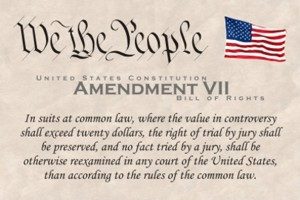 In a labor dispute: “Williams argues that the record is replete with evidence that contradicts the Flex Entities’ version of the events, including his driver logs that show during the time he was purportedly nonresponsive, he was in a remote area out of range for his cell phone, on break, or asleep in his truck,and he did in fact accept and deliver loads on the days referenced in the emails.” The argument was unavailing: “The jury, as the fact finder, was in the best position to judge the credibility of the witnesses and the weight to be given their testimony, including the validity of the logs Williams created. In this case, the jury found the testimony of the Flex Entities’ witnesses and the internal emails documenting issues with Williams, which began a full month before Williams complained about his pay, to be more credible than the testimony of Williams and his account of why he did not respond to dispatch.” Williams v. FlexFrac Transport LLC, No. 05-16-01032-CV (Feb. 5, 2018) (mem. op.)
In a labor dispute: “Williams argues that the record is replete with evidence that contradicts the Flex Entities’ version of the events, including his driver logs that show during the time he was purportedly nonresponsive, he was in a remote area out of range for his cell phone, on break, or asleep in his truck,and he did in fact accept and deliver loads on the days referenced in the emails.” The argument was unavailing: “The jury, as the fact finder, was in the best position to judge the credibility of the witnesses and the weight to be given their testimony, including the validity of the logs Williams created. In this case, the jury found the testimony of the Flex Entities’ witnesses and the internal emails documenting issues with Williams, which began a full month before Williams complained about his pay, to be more credible than the testimony of Williams and his account of why he did not respond to dispatch.” Williams v. FlexFrac Transport LLC, No. 05-16-01032-CV (Feb. 5, 2018) (mem. op.)
 At least outside the Rule 91a context: “Texas follows a fair-notice pleading standard; the opposing party must be able to ascertain the nature and basic issues of the controversy and what testimony will be relevant from the pleading. Horizon/CMS Healthcare Corp. v. Auld, 34 S.W.3d 887, 896 (Tex. 2000); COC Servs., Ltd. v. CompUSA, Inc., 150 S.W.3d 654, 677 (Tex. App.—Dallas 2004, pet. denied). The purpose of fair-notice pleading is to provide a defendant with sufficient information to prepare a defense. Horizon/CMS Healthcare Corp., 34 S.W.3d at 897.” Cerna v. Smith, No. 05-17-00178-CV (Feb. 2, 2018) (mem. op.)
At least outside the Rule 91a context: “Texas follows a fair-notice pleading standard; the opposing party must be able to ascertain the nature and basic issues of the controversy and what testimony will be relevant from the pleading. Horizon/CMS Healthcare Corp. v. Auld, 34 S.W.3d 887, 896 (Tex. 2000); COC Servs., Ltd. v. CompUSA, Inc., 150 S.W.3d 654, 677 (Tex. App.—Dallas 2004, pet. denied). The purpose of fair-notice pleading is to provide a defendant with sufficient information to prepare a defense. Horizon/CMS Healthcare Corp., 34 S.W.3d at 897.” Cerna v. Smith, No. 05-17-00178-CV (Feb. 2, 2018) (mem. op.)
 Appellant alleged that she established a “loss of ownership resulting from a legal proceeding” within the meaning of a real estate listing agreement, which would excuse the obligation to pay a broker’s commission. Unfortunately, while the relevant “divorce proceeding created a cloud on the [p]roperty’s title, and, as a result, the title company couldnot issue a title policy as required by the sales agreement,” that did not create the requisite “loss” – “By definition . . . a cloud on title does not equate to a loss of ownership. . . . [A] cloud is something with the potential to affect ownership if and when it is established as valid.” Ruder v. Jordan, No. 05-16-00742-CV (Feb. 2, 2018) (mem. op.)
Appellant alleged that she established a “loss of ownership resulting from a legal proceeding” within the meaning of a real estate listing agreement, which would excuse the obligation to pay a broker’s commission. Unfortunately, while the relevant “divorce proceeding created a cloud on the [p]roperty’s title, and, as a result, the title company couldnot issue a title policy as required by the sales agreement,” that did not create the requisite “loss” – “By definition . . . a cloud on title does not equate to a loss of ownership. . . . [A] cloud is something with the potential to affect ownership if and when it is established as valid.” Ruder v. Jordan, No. 05-16-00742-CV (Feb. 2, 2018) (mem. op.)
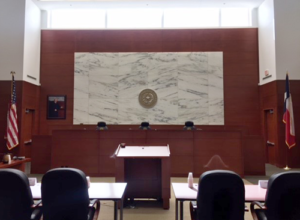 The Fifth Court’s website reports: “On January 30, 2018, the Fifth Court of Appeals held inaugural oral arguments in the historic Dallas County Merrill Hartman Courtroom located on the 8th Floor of the George Allen Sr. Courts Building [right]. Thanks to a joint effort between the Dallas County Commissioners, the Dallas District Courts, and the Fifth Court of Appeals, the Merrill Hartman Courtroom’s judicial bench was redesigned to accommodate the 13 appellate court justices in en banc settings as well as 3 member panels. The Fifth Court of Appeals also serves as the disaster recovery site for the nine member Texas Supreme Court. Both appellate courts, and district courts will utilize the courtroom. Upon final completion of renovations, a re-dedication ceremony is planned on a date to be determined in April 2018.”
The Fifth Court’s website reports: “On January 30, 2018, the Fifth Court of Appeals held inaugural oral arguments in the historic Dallas County Merrill Hartman Courtroom located on the 8th Floor of the George Allen Sr. Courts Building [right]. Thanks to a joint effort between the Dallas County Commissioners, the Dallas District Courts, and the Fifth Court of Appeals, the Merrill Hartman Courtroom’s judicial bench was redesigned to accommodate the 13 appellate court justices in en banc settings as well as 3 member panels. The Fifth Court of Appeals also serves as the disaster recovery site for the nine member Texas Supreme Court. Both appellate courts, and district courts will utilize the courtroom. Upon final completion of renovations, a re-dedication ceremony is planned on a date to be determined in April 2018.”
 In The Art of War, Sun-Tzu famously described nine types of ground where battles could occur. In Medina v. Michelin North America, the Fifth Court reminded that summary judgment can only occur on the specified grounds, especially for a no-evidence motion:
In The Art of War, Sun-Tzu famously described nine types of ground where battles could occur. In Medina v. Michelin North America, the Fifth Court reminded that summary judgment can only occur on the specified grounds, especially for a no-evidence motion:
“Michelin’s only basis for no-evidence summary judgment motion on these claims was the lack or absence of expert testimony should the trial court grant its motion to exclude [plaintiff’s expert’s] testimony. The no-evidence motion itself specifically requested the trial court not consider the no-evidence summary judgment motion on these claims until it considered and ruled on its motion to exclude. In granting summary judgment on these claims after denying Michelin’s motion to exclude, however, the trial court necessarily concluded [that the expert’s] testimony constituted no evidence. Because Michelin did not move for summary judgment on this ground, the trial court erred in granting summary judgment on the Medinas’ defective design, defective manufacturing, and negligence claims once it denied Michelin’s motion to exclude this testimony.”
No. 05-16-00794-CV (Jan. 29, 2018) (mem. op.) I presented the oral argument in this case for the appellants.
 Litigation about this year’s primary election led to a mandamus petition about the ballot in a judicial race, in which the Fifth Court “conditionally granted relator’s petition for writ of mandamus by written opinion and ordered the trial court to vacate the temporary restraining order. We determined that the proceeding in the district court was moot as to the primary election ballot at the time it was heard, and the resulting order was void.” The opposing party then filed a “cross-petition” about the same ballot, as to which the Court similarly held: ” That relief is unavailable because overseas and military ballots have already been printed and mailed for the March primary.” In re Williams, No. 05-18-00068-CV (Jan. 26, 2018) (mem. op.) While turning on an issue unique to election law, the opinion also illustrates how equitable defenses such as laches can affect the resolution of mandamus petitions.
Litigation about this year’s primary election led to a mandamus petition about the ballot in a judicial race, in which the Fifth Court “conditionally granted relator’s petition for writ of mandamus by written opinion and ordered the trial court to vacate the temporary restraining order. We determined that the proceeding in the district court was moot as to the primary election ballot at the time it was heard, and the resulting order was void.” The opposing party then filed a “cross-petition” about the same ballot, as to which the Court similarly held: ” That relief is unavailable because overseas and military ballots have already been printed and mailed for the March primary.” In re Williams, No. 05-18-00068-CV (Jan. 26, 2018) (mem. op.) While turning on an issue unique to election law, the opinion also illustrates how equitable defenses such as laches can affect the resolution of mandamus petitions.
 Section 38.001 of the Texas Civil Practice & Remedies Code refers to an award of “reasonable attorney’s fees” in types of cases. In Basic Energy Services v. Exco Resources, however, the parties’ contract “provide[d] for ‘all expenses of litigation, court costs, and attorneys’ fees which may be incurred by Company Group . . . ‘ and does not include any requirement that such amounts must be subsequently subjected to scrutiny for reasonableness.” Distinguishing an earlier case about a note dispute between two individuals, the Fifth Court reasoned that “two sophisticated, commercial entities” had negotiated an agreement under which the indemnitee:
Section 38.001 of the Texas Civil Practice & Remedies Code refers to an award of “reasonable attorney’s fees” in types of cases. In Basic Energy Services v. Exco Resources, however, the parties’ contract “provide[d] for ‘all expenses of litigation, court costs, and attorneys’ fees which may be incurred by Company Group . . . ‘ and does not include any requirement that such amounts must be subsequently subjected to scrutiny for reasonableness.” Distinguishing an earlier case about a note dispute between two individuals, the Fifth Court reasoned that “two sophisticated, commercial entities” had negotiated an agreement under which the indemnitee:
. . . could either (1) tender its defense to Basic thus allowing Basic to control the costs of litigation or (2) incur litigation expenses itself, negotiating with attorneys for fees that it would then submit to Basic for indemnification, risking Basic’s refusal or inability to pay and assuring itself of the reasonableness of the fees it was paying in the process. Accordingly, in view of the fact that the agreement at issue here was between two sophisticated, commercial entities presently familiar with the expenses of litigation, court costs and attorney’s fees and free to negotiate and structure their affairs as they sought fit, we see no reason to impose additional procedures beyond those they chose for themselves.
No. 05-15-00667-CV (Jan. 26, 2018) (mem. op.)
 The economic loss rule, and the related debate about the proper handling of “con-tort” claims, can raise difficult and close questions. Hames v. JP Morgan Chase, however, presents a relatively clean example. Hames alleged mishandling of her bank account, and argued that her negligence claim could proceed independently of her breach-of-contract claim, as the bank’s duties arose from Article 4 of the UCC.The Court disagreed, finding that “[t]he duties that Chase allegedly breached were dependent on its contact with Hames,” and noting authority that “[t]he relationship of a bank to a general depositor is conrractual, that of debtor-creditor arising from the depository contract.” Additionallly, “the account funds that Hames seeks to recover relate to the subject matter of the contract . . . ” No. 05-16-00472-CV (Jan. 22, 2018) (mem. op.)
The economic loss rule, and the related debate about the proper handling of “con-tort” claims, can raise difficult and close questions. Hames v. JP Morgan Chase, however, presents a relatively clean example. Hames alleged mishandling of her bank account, and argued that her negligence claim could proceed independently of her breach-of-contract claim, as the bank’s duties arose from Article 4 of the UCC.The Court disagreed, finding that “[t]he duties that Chase allegedly breached were dependent on its contact with Hames,” and noting authority that “[t]he relationship of a bank to a general depositor is conrractual, that of debtor-creditor arising from the depository contract.” Additionallly, “the account funds that Hames seeks to recover relate to the subject matter of the contract . . . ” No. 05-16-00472-CV (Jan. 22, 2018) (mem. op.)
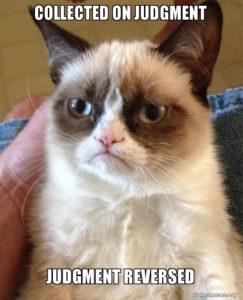 In Cruz v. Ghani, a judgment creditor executed on the judgment debtor’s condominium – realizing a sale price of $25,000, despite a market value of $217,500 – only to have the judgment later reversed on appeal. In the ensuing lawsuit about wrongful execution, the (former) judgment debtor prevailed and won judgment for the market value. The trial court required a supersedeas bond for the full amount and the Fifth Court affirmed. It concluded that the purpose of such an award was to compensate for loss, and thus did not fall within a line of authority holding that awards for equitable disgorgement do not have to be bonded, as they “are not based on an actual pecuniary loss suffered by the plaintiff, but on the defendant’s ill-gotten gains.” No. 05-17-00566-CV (Jan. 17, 2018) (mem. op.)
In Cruz v. Ghani, a judgment creditor executed on the judgment debtor’s condominium – realizing a sale price of $25,000, despite a market value of $217,500 – only to have the judgment later reversed on appeal. In the ensuing lawsuit about wrongful execution, the (former) judgment debtor prevailed and won judgment for the market value. The trial court required a supersedeas bond for the full amount and the Fifth Court affirmed. It concluded that the purpose of such an award was to compensate for loss, and thus did not fall within a line of authority holding that awards for equitable disgorgement do not have to be bonded, as they “are not based on an actual pecuniary loss suffered by the plaintiff, but on the defendant’s ill-gotten gains.” No. 05-17-00566-CV (Jan. 17, 2018) (mem. op.)
 Appellant sought a new trial based on the lack of a reporter’s record from the key summary judgment hearing, citing Tex. R. App. P. 13.1 and 34.6(f). Neither citation worked. As to Rule 13.1, which lists the duties of a court reporter, “[t]he Texas Supreme Court has held that creating a reporter’s record is neither necessary nor appropriate to the purposes of a summary judgment hearing.” (citation omitted). And Rule 34.6(f), which “provides that an appellant is entitled to a new trial if a significant exhibit or portion of a reporter’s record is lost or destroyed,” was inapplicable because “[b]oth parties acknowledge a reporter’s record was never made.” Lynch v. O’Hare, No. 05-17-00175-CV (Jan. 18, 2018) (mem. op.)
Appellant sought a new trial based on the lack of a reporter’s record from the key summary judgment hearing, citing Tex. R. App. P. 13.1 and 34.6(f). Neither citation worked. As to Rule 13.1, which lists the duties of a court reporter, “[t]he Texas Supreme Court has held that creating a reporter’s record is neither necessary nor appropriate to the purposes of a summary judgment hearing.” (citation omitted). And Rule 34.6(f), which “provides that an appellant is entitled to a new trial if a significant exhibit or portion of a reporter’s record is lost or destroyed,” was inapplicable because “[b]oth parties acknowledge a reporter’s record was never made.” Lynch v. O’Hare, No. 05-17-00175-CV (Jan. 18, 2018) (mem. op.)
 A court of appeals can grant mandamus relief if a trial court refuses to rule within a reasonable time. (A good, recent example is In re Mesa Petroleum Partners LP, an El Paso case I was involved with.) But January 2018 is too soon to complain about alleged inaction in connection with rulings made on December 15, 2017 – in that situation, “[t]o the extent relator seeks a separate order in his motion to clarify, the trial court has not been given a reasonable time in which to sign such an order and relator has not presented a record showing that he has requested an order from the trial court.” In re Venkartaman, No. 05-17-01474-CV (Jan. 9, 2018) (mem. op.)
A court of appeals can grant mandamus relief if a trial court refuses to rule within a reasonable time. (A good, recent example is In re Mesa Petroleum Partners LP, an El Paso case I was involved with.) But January 2018 is too soon to complain about alleged inaction in connection with rulings made on December 15, 2017 – in that situation, “[t]o the extent relator seeks a separate order in his motion to clarify, the trial court has not been given a reasonable time in which to sign such an order and relator has not presented a record showing that he has requested an order from the trial court.” In re Venkartaman, No. 05-17-01474-CV (Jan. 9, 2018) (mem. op.)
 Plaintiff alleged that his counsel’s negligence as to the handling of evidence about certain property appraisals led to an unfavorable settlement. The Fifth Court affirmed summary judgment for the defense, noting that the appraisals only became relevant if a particular ruling was made on a threshold legal issue, and the plaintiff’s expert affidavit “contained no analysis of the law or the facts relating to” whether “[P]laintiff would have prevailed on the payment issue at trial.” “Therefore a ‘fatal analytical gap’ in [the expert’s affidavit divide his recitation of the facts from his opinion of the ‘true value’ of the case, and we ‘are simply left to take his word’ that the settlement was excessive.” Barnett v. Schiro, No. 05-16-00999-CV (Jan. 9, 2018) (mem. op.)
Plaintiff alleged that his counsel’s negligence as to the handling of evidence about certain property appraisals led to an unfavorable settlement. The Fifth Court affirmed summary judgment for the defense, noting that the appraisals only became relevant if a particular ruling was made on a threshold legal issue, and the plaintiff’s expert affidavit “contained no analysis of the law or the facts relating to” whether “[P]laintiff would have prevailed on the payment issue at trial.” “Therefore a ‘fatal analytical gap’ in [the expert’s affidavit divide his recitation of the facts from his opinion of the ‘true value’ of the case, and we ‘are simply left to take his word’ that the settlement was excessive.” Barnett v. Schiro, No. 05-16-00999-CV (Jan. 9, 2018) (mem. op.)
The following summary judgment motion was granted, and the Fifth Court affirmed, rejecting challenges to the level of detail in the motion (as well as the non-respondent’s citation to evidence not expressly incorporated in the response):
_____________________________________________________________________
Summary of the Motion
Plaintiffs seek summary judgment on their claims against Thomas J. Granata, II because he guaranteed the debt of Full Spectrum Diagnostics, LLC. The default judgment was entered against Full Spectrum Diagnostics, LLC on June 1, 2016. Mr. Granata guaranteed the amount of indebtedness of Full Spectrum Diagnostics, LLC. Therefore, Plaintiffs are entitled to summary judgment against Mr. Granata.
Undisputed Facts
Mr. Granata guaranteed the promissory note made by Full Spectrum Diagnostics, LLC. Full Spectrum Diagnostics, LLC. only paid $50,000 of the note via a third party. The note was to be repaid by October 26, 2015. No payment has been forthcoming on said promissory note cents [sic] the $50,000 payment was made by the third-party. On June 1, 2016, the court entered a default judgment against Full Spectrum Diagnostics, LLC based on the promissory note in the amount of the unpaid principal balance of the note along with interest.
Argument and Authorities
The Court should grant the motion for summary judgment against Mr. Granata because Mr. Granata guaranteed the obligation of Full Spectrum Diagnostics, LLC. A default judgment was entered against that company for the promissory note Mr. Granata guaranteed. Therefore, the Court should grant the summary judgment against Mr. Granata for the same amount as the default judgment.
Prayer
WHEREFORE, Plaintiffs request the Court enter a Summary Judgment
corresponding to the default judgment entered against Full Spectrum Diagnostics,
LLC as follows:a. Monetary relief of $220,000.00; b. Interest in the amount of $8,066.67 through February 25, 2016 and 8% interest on the monetary relief expressed above, compounded annually, until paid in full.
(Citations to exhibits omitted.) Granata v. Kroese, No. 05-17-00118-CV (Jan. 10, 2018) (mem. op.)
A civil forfeiture action arising from a criminal conviction produced a succinct reminder about review for evidentiary sufficiency: “Wife’s testimony was equivocal, and the trial court was free to disbelieve her. See McGalliard v. Kuhlm ann, 722 S.W.2d 694, 697 (Tex. 1986) (fact finder may believe one witness and disbelieve others).” One 2007 Lexus v. State, No. 05-16-01296-CV (Jan. 8, 2018) (mem. op.)
ann, 722 S.W.2d 694, 697 (Tex. 1986) (fact finder may believe one witness and disbelieve others).” One 2007 Lexus v. State, No. 05-16-01296-CV (Jan. 8, 2018) (mem. op.)
 The appellant in Bowser v. Craig Ranch Emergency Hospital LLC, a medical negligence case, argued that a Casteel situation arose “because the single [liability] question . . . combined the negligence issue and the proximate cause issue, so it is impossible to assess how the jury was affected by the erroneous proximate cause instruction.” The Fifth Court disagreed: “The Texas Supreme Court has specifically limited its holding in Casteel and its progeny to the submission of broad-form questions incorporating multiple theories of liability or multiple damage elements.” No. 05-16-00639-CV (Jan. 8, 2018) (mem. op.) (citing Bed, Bath & Beyond, Inc. v. Urista, 211 S.W.3d 753, 757 (Tex. 2006)).
The appellant in Bowser v. Craig Ranch Emergency Hospital LLC, a medical negligence case, argued that a Casteel situation arose “because the single [liability] question . . . combined the negligence issue and the proximate cause issue, so it is impossible to assess how the jury was affected by the erroneous proximate cause instruction.” The Fifth Court disagreed: “The Texas Supreme Court has specifically limited its holding in Casteel and its progeny to the submission of broad-form questions incorporating multiple theories of liability or multiple damage elements.” No. 05-16-00639-CV (Jan. 8, 2018) (mem. op.) (citing Bed, Bath & Beyond, Inc. v. Urista, 211 S.W.3d 753, 757 (Tex. 2006)).
 The appellant in an unsuccessful wrongful-termiantion suit pointed to hearing testimony that he said “evinced a negative attitude . . . that [his] allegations were ‘very egregious and very inflammatory.” The Fifth Court affirmed summary judgment against him, noting on this point that the testimony addressed the nature of the allegations and was not a negative statement about the report itself.” Hackbarth v. UT-Dallas, No. 05-16-01250-CV (Jan. 4, 2018).
The appellant in an unsuccessful wrongful-termiantion suit pointed to hearing testimony that he said “evinced a negative attitude . . . that [his] allegations were ‘very egregious and very inflammatory.” The Fifth Court affirmed summary judgment against him, noting on this point that the testimony addressed the nature of the allegations and was not a negative statement about the report itself.” Hackbarth v. UT-Dallas, No. 05-16-01250-CV (Jan. 4, 2018).
NRG failed to attend a court-ordered mediation. The court entered “death penalty” sanctions and NRG sought a new trial, alleging problems with notice and difficutly finding appropriate counsel (as an LLC, NRG could not appear pro se). The Fifth Court reversed, finding (1) no direct relationship between the sanction and the harm (incurred expenses) to the other party, (2) a failure to test less sanctions, and (3) potentially meritorious defenses. NRG & Associates v. Service Transfer, LLC, No. 05-16-01375-CV (Dec. 21, 2017) (mem. op.)
 While finding that a statement in a cease-and-desist letter fell within the scope of the TCPA, the Fifth Court found a failure to state an actionable claim in response to a TCPA dismissal motion. As to tortious interference, the plaintiff’s damages allegations fell short of Elliott v. S&S Emergency Training Solutions, Inc., No. 05-16-01373-CV, 2017 WL 2118787 (Tex. App.—Dallas May 16, 2017, pet. filed); as to the tort of “invasion of seclusion,” the allegations failed because “[s]everal courts, including our own, have consistently held that an intrusion upon seclusion claim fails without evidence of a physical intrusion or eavesdropping on another’s conversation with the aid of wiretaps, microphones, or spying.” Morales v. Barnes, No. 05-17-00316-CV (Dec. 29, 2017) (mem. op.)
While finding that a statement in a cease-and-desist letter fell within the scope of the TCPA, the Fifth Court found a failure to state an actionable claim in response to a TCPA dismissal motion. As to tortious interference, the plaintiff’s damages allegations fell short of Elliott v. S&S Emergency Training Solutions, Inc., No. 05-16-01373-CV, 2017 WL 2118787 (Tex. App.—Dallas May 16, 2017, pet. filed); as to the tort of “invasion of seclusion,” the allegations failed because “[s]everal courts, including our own, have consistently held that an intrusion upon seclusion claim fails without evidence of a physical intrusion or eavesdropping on another’s conversation with the aid of wiretaps, microphones, or spying.” Morales v. Barnes, No. 05-17-00316-CV (Dec. 29, 2017) (mem. op.)
 Craig moved to vacate an arbitration award: “Thus, under [Tex. Civ. Prac. & Rem. Code] section 171.094, she was required to arrange for service of process on appellees upon filing the motion. Craig did not arrange for service of process until she filed her supplemental motion to vacate on September 1, 2016, more than five months after the arbitration panel entered its award. Because she did not serve notice of her motion to vacate within [FAA] Section 12’s three-month limitations period, the service was untimely and the trial court was required to dismiss her motion as untimely.” The Fifth Court declined to apply any equitable tolling doctrine, and rejected an earlier emailing of the motion as inadequate under the TAA’s procedural requirements. Craig v. Southwest Securities, No. 05-16-01378-CV (Dec. 18, 2017) (mem. op.)
Craig moved to vacate an arbitration award: “Thus, under [Tex. Civ. Prac. & Rem. Code] section 171.094, she was required to arrange for service of process on appellees upon filing the motion. Craig did not arrange for service of process until she filed her supplemental motion to vacate on September 1, 2016, more than five months after the arbitration panel entered its award. Because she did not serve notice of her motion to vacate within [FAA] Section 12’s three-month limitations period, the service was untimely and the trial court was required to dismiss her motion as untimely.” The Fifth Court declined to apply any equitable tolling doctrine, and rejected an earlier emailing of the motion as inadequate under the TAA’s procedural requirements. Craig v. Southwest Securities, No. 05-16-01378-CV (Dec. 18, 2017) (mem. op.)
 Except for a claim based on a contract with D/FW Airport, as to which the Legislature had partially waived immunity, the Airport was otherwise immune from suit: “The parties agree that the Board hired Vizant to reduce the costs of collecting fees for processing credit card payments. The record shows that the Board collects those fees in connection with its operation of an airport, something it is expressly authorized by statute to do. he operation of an airport is expressly defined by statute as a governmental function that is exercised for a public purpose and is a matter of public necessity. And an airport is expressly designated by statute to be a nonproprietary function. A plaintiff may not split various aspects of a city’s operation into discrete functions and recharacterize certain of those functions as proprietary.” DFW Int’l Airport Board v. Vizant Technologies, No. 05-17-00090-CV (Dec. 15, 2017) (mem. op.) (citations omitted).
Except for a claim based on a contract with D/FW Airport, as to which the Legislature had partially waived immunity, the Airport was otherwise immune from suit: “The parties agree that the Board hired Vizant to reduce the costs of collecting fees for processing credit card payments. The record shows that the Board collects those fees in connection with its operation of an airport, something it is expressly authorized by statute to do. he operation of an airport is expressly defined by statute as a governmental function that is exercised for a public purpose and is a matter of public necessity. And an airport is expressly designated by statute to be a nonproprietary function. A plaintiff may not split various aspects of a city’s operation into discrete functions and recharacterize certain of those functions as proprietary.” DFW Int’l Airport Board v. Vizant Technologies, No. 05-17-00090-CV (Dec. 15, 2017) (mem. op.) (citations omitted).
 In BB&T v. SWIG Partners LP, the Fifth Court reversed a limitations ruling based on allegedly inadequate efforts to serve all of the defendants, observing: “Twelve of the thirty named defendants were served within three weeks after citations were issued. All the defendants then made an appearance obviating the need for further service of process. See Tex. R. Civ. P. 120. The longest period of time without service on a defendant before all the defendants answered was four business days. The time between the date suit was filed and the date all defendants filed their original answer was twenty-eight days. When three of the defendants were omitted from the defendants’ amended answer, BB&T moved for substitute service. In granting BB&T’s motions for substitute service, the trial court repeatedly found BB&T had diligently attempted service on each of the subject defendants.” No. 05-15-00878-CV (Dec. 13, 2017) (mem. op.)
In BB&T v. SWIG Partners LP, the Fifth Court reversed a limitations ruling based on allegedly inadequate efforts to serve all of the defendants, observing: “Twelve of the thirty named defendants were served within three weeks after citations were issued. All the defendants then made an appearance obviating the need for further service of process. See Tex. R. Civ. P. 120. The longest period of time without service on a defendant before all the defendants answered was four business days. The time between the date suit was filed and the date all defendants filed their original answer was twenty-eight days. When three of the defendants were omitted from the defendants’ amended answer, BB&T moved for substitute service. In granting BB&T’s motions for substitute service, the trial court repeatedly found BB&T had diligently attempted service on each of the subject defendants.” No. 05-15-00878-CV (Dec. 13, 2017) (mem. op.)
 A Mexican company disputed personal jurisdiction in Texas, but ran afoul of special appearance procedure: “A special appearance that merely challenges the method of service fails as a special appearance and constitutes a general appearance. A complaint that a defendant was not served in acccordance with the Hague Convention is a complaint regarding a curable defect in service of process. Such a complaint does not defeat a nonresident’s amenability to the court’s process and thus should not be raised via a special appearance.” Vitro Packaging de Mexico v. Dubiel, No. 05-17-00258-CV (applying Kawasaki Steel Corp. v. Middleton, 699 S.W.2d 199, 202 (Tex. 1985)) (Dec. 13, 2017) (mem. op.) (citations omitted, emphasis added)
A Mexican company disputed personal jurisdiction in Texas, but ran afoul of special appearance procedure: “A special appearance that merely challenges the method of service fails as a special appearance and constitutes a general appearance. A complaint that a defendant was not served in acccordance with the Hague Convention is a complaint regarding a curable defect in service of process. Such a complaint does not defeat a nonresident’s amenability to the court’s process and thus should not be raised via a special appearance.” Vitro Packaging de Mexico v. Dubiel, No. 05-17-00258-CV (applying Kawasaki Steel Corp. v. Middleton, 699 S.W.2d 199, 202 (Tex. 1985)) (Dec. 13, 2017) (mem. op.) (citations omitted, emphasis added)
 In Walls v. Capella Park Homeowners’ Association, Inc., the Fifth Court recapped the standards for a “trial on stipulated facts” under Tex. R. Civ. P. 263 – a useful and underappreciated rule. “An agreed statement of facts under rule 263 is similar to a special verdict; it is the parties’ request for judgment under the applicable law. In a rule 263 agreed case, the only issue on appeal is whether the district court properly applied the law to the agreed facts. Such a review is less deferential to the trial court, because a trial court has no discretion in deciding what the law is or in properly applying it. Id. If the trial court files findings of fact in an agreed case, they are disregarded by the appellate court.” No. 05-16-00783-CV (Nov. 30, 2017) (applying Addison Urban Development Partners v. Alan Ritchey Materials, 437 S.W.3d 597, 600 (Tex. App.—Dallas 2014, no pet.)).
In Walls v. Capella Park Homeowners’ Association, Inc., the Fifth Court recapped the standards for a “trial on stipulated facts” under Tex. R. Civ. P. 263 – a useful and underappreciated rule. “An agreed statement of facts under rule 263 is similar to a special verdict; it is the parties’ request for judgment under the applicable law. In a rule 263 agreed case, the only issue on appeal is whether the district court properly applied the law to the agreed facts. Such a review is less deferential to the trial court, because a trial court has no discretion in deciding what the law is or in properly applying it. Id. If the trial court files findings of fact in an agreed case, they are disregarded by the appellate court.” No. 05-16-00783-CV (Nov. 30, 2017) (applying Addison Urban Development Partners v. Alan Ritchey Materials, 437 S.W.3d 597, 600 (Tex. App.—Dallas 2014, no pet.)).
 Acra v. Bonaudo illustrates the “falling dominoes” problem that can arise from discovery issues. Appellants sought to supersede a judgment with relatively small bonds. The district court found problems with their discovery responses, which interfered with their ability to establish a low net worth at the hearing about bond size. The Fifth Court affirmed: “On the record before us, we deny the request to vacate the trial court’s orders. Without evidence of all of Acra’s and Secner HR’s assets and liabilities, the trial court could not determine their individual net worth. And, without a determination of their individual net worth, the amount of bond, set in accordance with civil practice and remedies code section 52.006 and appellate rule 24.2(a)(1), was not an abuse of discretion.” No. 05-17-00451-CV (Dec. 8, 2017) (mem. op.)
Acra v. Bonaudo illustrates the “falling dominoes” problem that can arise from discovery issues. Appellants sought to supersede a judgment with relatively small bonds. The district court found problems with their discovery responses, which interfered with their ability to establish a low net worth at the hearing about bond size. The Fifth Court affirmed: “On the record before us, we deny the request to vacate the trial court’s orders. Without evidence of all of Acra’s and Secner HR’s assets and liabilities, the trial court could not determine their individual net worth. And, without a determination of their individual net worth, the amount of bond, set in accordance with civil practice and remedies code section 52.006 and appellate rule 24.2(a)(1), was not an abuse of discretion.” No. 05-17-00451-CV (Dec. 8, 2017) (mem. op.)
 DRI’s 2018 Appellate Advocacy Seminar will be held at the Planet Hollywood Resort in Las Vegas from March 14-15, 2018. This year’s seminar will include valuable insights into effective advocacy (including tips from Bryan Garner), and joint sessions with trial court practitioners. The seminar promises great networking opportunities with judges, appellate practitioners and trial advocates from across the country. This year’s seminar will be held in conjunction with the Trial Tactics Seminar, and anyone attending the appellate seminar can attend the final day of the Trial Tactics Seminar for no cost. The seminar also coincides with the beginning of the NCAA men’s basketball tournament, a great time to enjoy the excitement of Las Vegas. You can register for the Appellate Seminar here. Save $100 and get the best hotel rates when you register and book by February 13, 2018.
DRI’s 2018 Appellate Advocacy Seminar will be held at the Planet Hollywood Resort in Las Vegas from March 14-15, 2018. This year’s seminar will include valuable insights into effective advocacy (including tips from Bryan Garner), and joint sessions with trial court practitioners. The seminar promises great networking opportunities with judges, appellate practitioners and trial advocates from across the country. This year’s seminar will be held in conjunction with the Trial Tactics Seminar, and anyone attending the appellate seminar can attend the final day of the Trial Tactics Seminar for no cost. The seminar also coincides with the beginning of the NCAA men’s basketball tournament, a great time to enjoy the excitement of Las Vegas. You can register for the Appellate Seminar here. Save $100 and get the best hotel rates when you register and book by February 13, 2018.
 In Grynberg v. Grynberg, the Fifth Court affirmed a forum non conveniens dismissal when the only meaningful connection between Texas and the dispute was the incorporation of the relevant business in Texas: “Although this case involves a single connection to Texas through the incorporation of Pricaspian, it is a controversy
In Grynberg v. Grynberg, the Fifth Court affirmed a forum non conveniens dismissal when the only meaningful connection between Texas and the dispute was the incorporation of the relevant business in Texas: “Although this case involves a single connection to Texas through the incorporation of Pricaspian, it is a controversy  involving an entity that maintains its offices in Colorado and individuals who, other than [one], reside in Colorado.” The Court also rejected an argument that the “internal affairs doctrine” created a jurisdictional impediment to a Colorado court proceeding with claims about the governance of the Texas business, finding that the doctrine was a choice-of-law concept rather than a jurisdictional limit. No. 05-16-00636-CV (Nov. 28, 2017) (mem. op.) (The “Pricaspian,” incidentally, is a large salt basin northwest of the Caspian Sea.)
involving an entity that maintains its offices in Colorado and individuals who, other than [one], reside in Colorado.” The Court also rejected an argument that the “internal affairs doctrine” created a jurisdictional impediment to a Colorado court proceeding with claims about the governance of the Texas business, finding that the doctrine was a choice-of-law concept rather than a jurisdictional limit. No. 05-16-00636-CV (Nov. 28, 2017) (mem. op.) (The “Pricaspian,” incidentally, is a large salt basin northwest of the Caspian Sea.)
 A clean example of “no evidence,” as a result of the terms of a legal document, appears in Coyle v. Jones: “The express language of the Agreement creating the trust at issue provided that the trust agreement could be revoked ‘at any time during the joint lives of the Trustors.’ (emphasis added). The Agreement further provided that other than that, when either trustor died, “the designation of Beneficiaries of specific gifts in this Trust shall become irrevocable, and not subject to amendment or modification.” The only evidence of revocation before the jury, however, was Frances’s 2010 written revocation. It is undisputed that Frances executed the revocation almost nine years after Stuart’s death.” No. 05-16-00876-CV (Nov. 30, 2017) (mem. op.)
A clean example of “no evidence,” as a result of the terms of a legal document, appears in Coyle v. Jones: “The express language of the Agreement creating the trust at issue provided that the trust agreement could be revoked ‘at any time during the joint lives of the Trustors.’ (emphasis added). The Agreement further provided that other than that, when either trustor died, “the designation of Beneficiaries of specific gifts in this Trust shall become irrevocable, and not subject to amendment or modification.” The only evidence of revocation before the jury, however, was Frances’s 2010 written revocation. It is undisputed that Frances executed the revocation almost nine years after Stuart’s death.” No. 05-16-00876-CV (Nov. 30, 2017) (mem. op.)
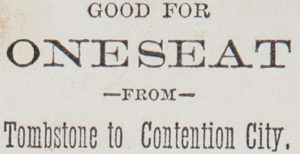 In a rare grant of mandamus relief about written discovery, based on the “heart of a party’s case” concept of irreparable injury, the Fifth Court strongly endorsed the use of “contention” interrogatories and related requests for production. Requests as to which it granted relief included ones seeking:
In a rare grant of mandamus relief about written discovery, based on the “heart of a party’s case” concept of irreparable injury, the Fifth Court strongly endorsed the use of “contention” interrogatories and related requests for production. Requests as to which it granted relief included ones seeking:
- “Specific factual and legal basis for establishing a fiduciary duty owed by Coralli
to Vola. (Interrogatory No. 17)”; - “Documents Vola contends establish, demonstrate, or prove the amount of
uniforms Sting Soccer committed to purchasing from Vola as alleged in
paragraph 17 of the first amended petition. (Request No. 27)”; and - “Documents Vola contends establish, demonstrate, or prove the amount of damages alleged owed to Vola by Sting Soccer. (Request No. 35).”
The opinion makes other useful statements about appropriate discovery objections and requests for admission. In re Sting Soccer Group, No. 05-17-00317-CV (Nov. 30, 2017) (mem. op.)
 It’s that time of year again. The polls are open until the end of November to vote for next year’s listings of Texas SuperLawyers; online voting can be done at the SuperLawyers website, here.
It’s that time of year again. The polls are open until the end of November to vote for next year’s listings of Texas SuperLawyers; online voting can be done at the SuperLawyers website, here.
 Appellant filed a notice of appeal about a special appearance that was timely, measured from the ruling on a motion to amend and reconsider, but was not timely, when measured from the original ruling. The Fifth Court found that it was untimely: “The record here reflects the issue in the special appearance was whether the trial court could exercise specific jurisdiction over appellant. Appellant’s motion to amend and reconsider did not present any new arguments. Instead, it cited to decisions issued after the original order was signed, none of which changed the state of the law regarding specific jurisdiction. Because the motion to amend and reconsider presented no new argument, we conclude the amended order denying appellant’s special appearance was not independently appealable and agree with appellees that appellant should have filed its notice of appeal within twenty days of the signing of the original order.” Michelin North America v. Gallegos, No. 05-17-00617-CV (Nov. 21, 2017) (mem. op.)
Appellant filed a notice of appeal about a special appearance that was timely, measured from the ruling on a motion to amend and reconsider, but was not timely, when measured from the original ruling. The Fifth Court found that it was untimely: “The record here reflects the issue in the special appearance was whether the trial court could exercise specific jurisdiction over appellant. Appellant’s motion to amend and reconsider did not present any new arguments. Instead, it cited to decisions issued after the original order was signed, none of which changed the state of the law regarding specific jurisdiction. Because the motion to amend and reconsider presented no new argument, we conclude the amended order denying appellant’s special appearance was not independently appealable and agree with appellees that appellant should have filed its notice of appeal within twenty days of the signing of the original order.” Michelin North America v. Gallegos, No. 05-17-00617-CV (Nov. 21, 2017) (mem. op.)
 The appellant in Abuzaid v. Anani LLC, a user of the venerable AOL email service, alleged that he did not receive notice of a summary judgment hearing. The Fifth Ciurt first noted:
The appellant in Abuzaid v. Anani LLC, a user of the venerable AOL email service, alleged that he did not receive notice of a summary judgment hearing. The Fifth Ciurt first noted:
Texas Rule of Civil Procedure 21a allows for electronic service of documents “if the email address of the party or attorney to be served is on file with the electronic filing manager.” It is undisputed Abuzaid’s email was on file to receive electronic service of documents, and he repeatedly availed himself of the process. . . . The rule does not contemplate that electronic service is somehow incomplete when a party experiences computer or email issues. Rather, notice properly sent pursuant to rule 21a raises a presumption that notice was received.”
(citations omitted). Here, the appellant did not overcome that presumption:
“Under rule 21a, constructive notice may be established if the serving party presented evidence that the intended recipient engaged in instances of selective acceptance or refusal of service of documents. Here, Abuzaid has not denied receiving the January 13, 2016 email attaching the motions for summary judgments and stating, ‘We will notify you via separate correspondence with the hearing date on these motions.’ Further, the record establishes Abuzaid sent and received numerous electronic filings and notices without incident at the email address on file with the trial court up until the day before appellees’ electronically filed their summary judgment motions and notice of hearing. . . . . Given the conflicting evidence, it was within the trial court’s discretion not to believe Abuzaid’s unsupported, self-serving statements about computer issues causing him not to ‘see’ the delivered documents and determine he engaged in selective acceptance of documents.”
No. 05-16-00667-CV (Nov. 21, 2017) (mem. op.)
 While from the Fifth Circuit rather than the Dallas Court of Appeals, a recent case notes a fundamental principle in business litigation under Texas law. In it, that Court affirmed a JNOV motion on damages, under Texas law, when the plaintiff proved gross profits rather than net profits. “Its expert witness testified that he used ThermoTek’s gross profit margin—gross sales, less the cost of those goods sold, divided by gross sales—to calculate lost profits. He then stated that he reached his lost-profit totals for the VascuTherm units and wraps by (1) multiplying the average sales ThermoTek made to Wilford each month by the unit sales price and relevant time period, and (2) deducting the cost of the goods sold. But that is the very definition of gross profits. See Black’s Law Dictionary, supra (defining gross profits as “[t]otal sales revenue less the cost of the goods sold, no adjustment being made for additional expenses and taxes”). Motion Medical Technologies v. Thermotek, No. 16-11381 (Nov. 14, 2017).
While from the Fifth Circuit rather than the Dallas Court of Appeals, a recent case notes a fundamental principle in business litigation under Texas law. In it, that Court affirmed a JNOV motion on damages, under Texas law, when the plaintiff proved gross profits rather than net profits. “Its expert witness testified that he used ThermoTek’s gross profit margin—gross sales, less the cost of those goods sold, divided by gross sales—to calculate lost profits. He then stated that he reached his lost-profit totals for the VascuTherm units and wraps by (1) multiplying the average sales ThermoTek made to Wilford each month by the unit sales price and relevant time period, and (2) deducting the cost of the goods sold. But that is the very definition of gross profits. See Black’s Law Dictionary, supra (defining gross profits as “[t]otal sales revenue less the cost of the goods sold, no adjustment being made for additional expenses and taxes”). Motion Medical Technologies v. Thermotek, No. 16-11381 (Nov. 14, 2017).
 In FC Background LLC v. Fritze, the Fifth Court affirmed the trial court’s conclusion that a merger clause extinguished an arbitration clause in an earlier agreement between the parties. Distinguishing other cases on the general topic, the Court observed that those opinions involved a “subsequent agreement with the merger clause [that] expressly provided for the continued enforceability of prior agreements.” Here, however, the clause “does not contain the limiting language, ‘with respect to the subject matter hereof,’ and thenon-compete agreement incorporates by reference only the December 28 employment agreement but not the employment application that has the arbitration clause sought to be enforced. The merger clause here expressly supersedes any previous written or oral agreements between [the parties] relating to employment.” No. 05-17-00277-CV (Nov. 16, 2017) (mem. op.) (emphasis in original).
In FC Background LLC v. Fritze, the Fifth Court affirmed the trial court’s conclusion that a merger clause extinguished an arbitration clause in an earlier agreement between the parties. Distinguishing other cases on the general topic, the Court observed that those opinions involved a “subsequent agreement with the merger clause [that] expressly provided for the continued enforceability of prior agreements.” Here, however, the clause “does not contain the limiting language, ‘with respect to the subject matter hereof,’ and thenon-compete agreement incorporates by reference only the December 28 employment agreement but not the employment application that has the arbitration clause sought to be enforced. The merger clause here expressly supersedes any previous written or oral agreements between [the parties] relating to employment.” No. 05-17-00277-CV (Nov. 16, 2017) (mem. op.) (emphasis in original).
 A challenge to AAA’s notice of hearing was rejected, and the award confirmed, in Heriage v. BNSF Logistics: “The record shows the AAA sent notice of the May 4th arbitration hearing to appellants on two occasions via both electronic and certified mail––one was approximately two months before the hearing; the other six days before the hearing. The written notices were sent to the physical address listed in the agreement, and the electronic notices were sent to an email address that Herriage admitted he conducted business from in the past but that he no longer bothered to check and had never closed.” 05-16-01232-CV (Nov. 17, 2017) (mem. op.)
A challenge to AAA’s notice of hearing was rejected, and the award confirmed, in Heriage v. BNSF Logistics: “The record shows the AAA sent notice of the May 4th arbitration hearing to appellants on two occasions via both electronic and certified mail––one was approximately two months before the hearing; the other six days before the hearing. The written notices were sent to the physical address listed in the agreement, and the electronic notices were sent to an email address that Herriage admitted he conducted business from in the past but that he no longer bothered to check and had never closed.” 05-16-01232-CV (Nov. 17, 2017) (mem. op.)
 The Texas Lawbook has a good story about the recent opinion in H2R Restaurant Holdings LLC v. Rathbun, which affirmed a favorable ruling for our firm’s client in a temporary injunction dispute.
The Texas Lawbook has a good story about the recent opinion in H2R Restaurant Holdings LLC v. Rathbun, which affirmed a favorable ruling for our firm’s client in a temporary injunction dispute.
In Teel v. Sumrow, the Fifth Court reversed and rendered judgment for the defense in a suit for breach of fiduciary duty, finding that limitations had run on the claim as a matter of law. “[W]e note that the letter  Sumrow wrote to Dr. Bray in July 2008 indicates that by that time, Sumrow knew or suspected Teel had engaged in some wrongful conduct to wrongfully deprive Sumrow of money Sumrow believed Teel owed him (‘screw me out of my money’).” As for reasonable diligence, the Court observed: “[I]n financial affairs, many citizens take a good deal on faith – not everyone zealously checks his mail every day or his bank statement every month – but it would not require ‘daily’ or even monthly diligence to discover the injury alleged in this case.” No. 05-16-00840-CV (Nov. 13, 2017) (mem. op.)
Sumrow wrote to Dr. Bray in July 2008 indicates that by that time, Sumrow knew or suspected Teel had engaged in some wrongful conduct to wrongfully deprive Sumrow of money Sumrow believed Teel owed him (‘screw me out of my money’).” As for reasonable diligence, the Court observed: “[I]n financial affairs, many citizens take a good deal on faith – not everyone zealously checks his mail every day or his bank statement every month – but it would not require ‘daily’ or even monthly diligence to discover the injury alleged in this case.” No. 05-16-00840-CV (Nov. 13, 2017) (mem. op.)
 It’s that time of year again. The polls are open until the end of November to vote for next year’s listings of Texas SuperLawyers; online voting can be done at the SuperLawyers website, here.
It’s that time of year again. The polls are open until the end of November to vote for next year’s listings of Texas SuperLawyers; online voting can be done at the SuperLawyers website, here.
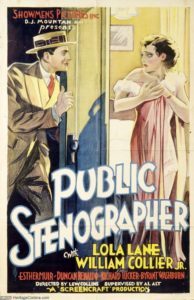 A trial was held, but after the verdict, a bankruptcy caused several years of inactivity before entry of final judgment in 2015. Unfortunately, in the meantime, a significant part of the reporter’s notes had been lost or destroyed. While Tex. R. App. 34.6 can require a new trial in such a situation if the loss occurs through no fault of the appealing party, the Fifth Court found it did not apply here. In Piotrowski v. Minns, the Texas Supreme Court noted that the applicable Government Code provision “authorizes reporters to cull stale notes from their records after three years when no party has requested otherwise,” whcih means that without a specific request from a litigant, “the litigant is not free from fault if the notes are destroyed as the statute authorizes. 873 S.W.2d 368, 371 (Tex. 1993). The Court found that Piotrowski was good law and controlled here, where no such request had been made in the relevant time period. Geeting v. Dyer, No. 05-16-00128-CV (Nov. 7, 2017) (mem. op.)
A trial was held, but after the verdict, a bankruptcy caused several years of inactivity before entry of final judgment in 2015. Unfortunately, in the meantime, a significant part of the reporter’s notes had been lost or destroyed. While Tex. R. App. 34.6 can require a new trial in such a situation if the loss occurs through no fault of the appealing party, the Fifth Court found it did not apply here. In Piotrowski v. Minns, the Texas Supreme Court noted that the applicable Government Code provision “authorizes reporters to cull stale notes from their records after three years when no party has requested otherwise,” whcih means that without a specific request from a litigant, “the litigant is not free from fault if the notes are destroyed as the statute authorizes. 873 S.W.2d 368, 371 (Tex. 1993). The Court found that Piotrowski was good law and controlled here, where no such request had been made in the relevant time period. Geeting v. Dyer, No. 05-16-00128-CV (Nov. 7, 2017) (mem. op.)
 The opinion in 7-Eleven, Inc. v. Cardtronics, Inc. reminds both of the importance of proving irreparable injury to obtain a temporary injunction, and the deferential standard of review if the trial court denies relief. Specially, 7-Eleven alleged that cancellation of a contract involving ATMs would cause business disruption, but the Fifth Court saw the evidence differently:
The opinion in 7-Eleven, Inc. v. Cardtronics, Inc. reminds both of the importance of proving irreparable injury to obtain a temporary injunction, and the deferential standard of review if the trial court denies relief. Specially, 7-Eleven alleged that cancellation of a contract involving ATMs would cause business disruption, but the Fifth Court saw the evidence differently:
“Seltzer’s testimony is nothing more than fear and speculation as to what may occur unsupported by any relevant data. Although the Agreement had been in place for almost ten years, 7-Eleven offered no evidence to show how over-the-counter sales have been impacted by the addition of the ATMs, or as specific to this case, the impact of the Allpoint network. This does not mean 7-Eleven had to prove any specific amount of damage, only that it needed to offer some concrete evidence that damages will in fact occur by something more than Seltzer’s unsupported conclusory opinion. As for Updyke, he testified only that the retailer loses between 65 and 80 percent of those ‘ATM customers, ATM transactions’ over time. He specifically stated he was not referring to over-the-counter sales customers. To the extent 7-Eleven relies on Cardtronics’s promotional material used to retain 7-Eleven’s business, the trial court could have reasonably seen that as nothing more than a sales pitch, not concrete evidence of specific irreparable harm. Under the particular facts before us, we conclude the trial court could have reasonably determined that 7-Eleven’s claim of harm is speculative and that 7-Eleven failed to demonstrate irreparable injury.
No. 05-17-00623-CV (Nov. 10, 2017) (mem. op.)
 In Nu-Build & Assocs. v. Sooners Group, LP, the Fifth Court drove home a recent holding about damages for cost of completion: “We agree because (i) a party seeking completion cost damages in tort and contract cases must prove that those costs are reasonable; and (ii) proof of amounts charged and paid, alone, is no evidence the
In Nu-Build & Assocs. v. Sooners Group, LP, the Fifth Court drove home a recent holding about damages for cost of completion: “We agree because (i) a party seeking completion cost damages in tort and contract cases must prove that those costs are reasonable; and (ii) proof of amounts charged and paid, alone, is no evidence the  payment was reasonable. Because Sooners adduced no evidence that the $3.6 million it paid to complete project was reasonable, we sustain Nu-Build’s fourth issue and [reverse and render].Mustang Pipeline Co., Inc. v. Driver Pipeline Co., Inc., 134 S.W.3d 195, 200–01 (Tex. 2004) (per curiam); 701 Katy Bldg., L.P. v. John Wheat Gibson, P.C., No. 05-16-00193-CV, 2017 WL 3634335, at *9 (Tex. App.—Dallas Aug. 24, 2017, no pet. h.) (mem. op.).
payment was reasonable. Because Sooners adduced no evidence that the $3.6 million it paid to complete project was reasonable, we sustain Nu-Build’s fourth issue and [reverse and render].Mustang Pipeline Co., Inc. v. Driver Pipeline Co., Inc., 134 S.W.3d 195, 200–01 (Tex. 2004) (per curiam); 701 Katy Bldg., L.P. v. John Wheat Gibson, P.C., No. 05-16-00193-CV, 2017 WL 3634335, at *9 (Tex. App.—Dallas Aug. 24, 2017, no pet. h.) (mem. op.).
 In recent years, the U.S. and Texas Supreme Court have been widely recognized as limiting the reach of long-arm personal jurisdiction. While the necessary showing is now more difficult in some case, it is far from impossible, as shown by Colmen LLC v. Santander Consumer USA, In that case, among other “[s]ince . . . 2015 . . . Colmen reached out to Santander in Texas to solicit the purchase of the fifty-two separate installment sales contracts at issue in this lawsuit. As required, for each individual contract, Colmen forwarded its proposed terms and conditions and all contractually required information, including customer credit-related information, to Santander’s offices in Texas.” No. 05-17-00101-CV (Nov. 3, 2017).
In recent years, the U.S. and Texas Supreme Court have been widely recognized as limiting the reach of long-arm personal jurisdiction. While the necessary showing is now more difficult in some case, it is far from impossible, as shown by Colmen LLC v. Santander Consumer USA, In that case, among other “[s]ince . . . 2015 . . . Colmen reached out to Santander in Texas to solicit the purchase of the fifty-two separate installment sales contracts at issue in this lawsuit. As required, for each individual contract, Colmen forwarded its proposed terms and conditions and all contractually required information, including customer credit-related information, to Santander’s offices in Texas.” No. 05-17-00101-CV (Nov. 3, 2017).
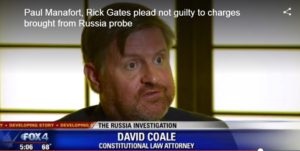 After the commercial, at about 2:30 in this news segment, I offer a couple of thoughts about recent developments in the Russia investigation.
After the commercial, at about 2:30 in this news segment, I offer a couple of thoughts about recent developments in the Russia investigation.
 Recent decisions have grappled with whether a “memorandum of decision” qualifies as a final judgment for purposes of starting appellate deadlines; the recent case of In re RKK further contributes to that dicsussion, finding that the trial court’s memorandum in that case did start the clock. No. 05-17-00794-CV (Oct. 25, 2017) (mem. op.)
Recent decisions have grappled with whether a “memorandum of decision” qualifies as a final judgment for purposes of starting appellate deadlines; the recent case of In re RKK further contributes to that dicsussion, finding that the trial court’s memorandum in that case did start the clock. No. 05-17-00794-CV (Oct. 25, 2017) (mem. op.)
In an uncommon but fundamental challenge to an arbitration agreement, the plaintiff relied upon his inability to understand English. The Fifth Court rejected this challenge under general principles of contract formation:
“It is unusual that MiCocina translated the Mutual Agreement to Arbitrate, summary plan description, and handbook into Spanish, but not the one-page Acknowledgment form. However, on this record, there is no evidence of a fraudulent misrepresentation or trickery that would relieve Balderas of the consequences of failing to read or have read to him a document he voluntarily signed. In light of the obligation an illiterate party has to have a document read to them before they sign it and the lack of evidence of a fraudulent misrepresentation or trickery, we conclude Balderas is bound by his signature on the Acknowledgment. Accordingly, Balderas failed to prove procedural unconscionability and fraudulent inducement.”
MiCocina v. Balderas, No. 05-16-01507-CV (Oct. 27, 2017) (mem. op.) (citations omitted; distinguishing Delfingen US-Texas, LP v. Valenzuela, 407 S.W.3d 791
(Tex. App.—El Paso 2013, no pet.)).T
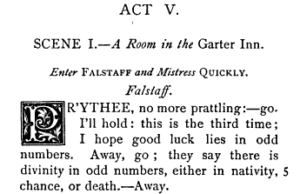 B.C. v. Steak & Shake involved a late-filed summary judgment response. The unsuccessful appellant sought rehearing en banc, which led to another opinion. Among other matters, the Court declined to consider a “supplemental clerk’s record” containing information about the logistics of the filing, when that material was not before the trial court or the Fifth Court at the time of its opinion. The Court quoted Chief Justice Hecht’s statement on the general subject in Worthy v. Collagen Corp., 967 S.W.2d 360, 366 Tex. 1998): “Supplementation of the record after a case is decided is a different matter. It certainly does not serve judicial economy for the appellate court to allow a supplementation of the record that would require it to reconsider its decision on the merits when the party has had ample opportunity to correct the omission prior to decision.” 967 S.W.2d 360, 366 (Tex. 1988). No. 05-14-00649-CV (Oct. 27, 2017) (suppl. op. on rehearing).
B.C. v. Steak & Shake involved a late-filed summary judgment response. The unsuccessful appellant sought rehearing en banc, which led to another opinion. Among other matters, the Court declined to consider a “supplemental clerk’s record” containing information about the logistics of the filing, when that material was not before the trial court or the Fifth Court at the time of its opinion. The Court quoted Chief Justice Hecht’s statement on the general subject in Worthy v. Collagen Corp., 967 S.W.2d 360, 366 Tex. 1998): “Supplementation of the record after a case is decided is a different matter. It certainly does not serve judicial economy for the appellate court to allow a supplementation of the record that would require it to reconsider its decision on the merits when the party has had ample opportunity to correct the omission prior to decision.” 967 S.W.2d 360, 366 (Tex. 1988). No. 05-14-00649-CV (Oct. 27, 2017) (suppl. op. on rehearing).
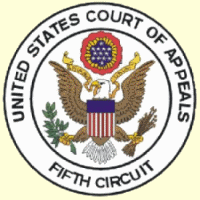 Of interest to all appellate practitioners, particularly those who may be planning on becoming board certified – the Fifth Circuit describes its newly-created Pro Bono Program as follows. Great opportunity for quality appellate experience!
Of interest to all appellate practitioners, particularly those who may be planning on becoming board certified – the Fifth Circuit describes its newly-created Pro Bono Program as follows. Great opportunity for quality appellate experience!
“The Program assists the Court by facilitating the appointment of pro bono counsel to represent pro se litigants. Pro Bono Panel members will, at the Court’s invitation, be appointed in civil appeals that, for example, present issues of first impression, complex facts or legal questions, or potentially meritorious claims warranting further briefing and/or oral argument.
Pro bono appointments are made by the Court, and are limited to proceedings before this Court. Although oral argument is not guaranteed, cases selected for the Program are likely to meet the Court’s criteria for granting oral argument.
Attorneys wishing to join the Pro Bono Panel should submit to the CMJS Office a cover letter (including statement of types of cases, if any, that counsel prefers or does not prefer), resumé, writing sample (appellate brief or brief of substantive motion), and statement of good standing in the Fifth Circuit Bar. Applications for panel membership should be emailed to the CMJS Office at probono@ca5.uscourts.gov. Questions about the program may be directed to Kate Clark, Administrative Attorney, at that email address or by telephone at 504-310-7799.”
 Over the summer, the Fifth Court thoroughly summarized and applied the many recent Supreme Court (both U.S. and Texas) cases about personal jurisdiction in Northern Frac Proppants v. 2011 NF Holdings. Specifically, “this appeal presents this central specific jurisdiction question: Do non-Texas residents who acquire and sell Wisconsin sand mines and related rights purposefully avail themselves of Texas if (i) Texas companies claim to be the assets’ rightful owners and (ii) the non-residents know that much of the sand produced in Wisconsin will be sold to customers for use in Texas fracing operations?” The Court “conclude[d] that the answer is no based on this case’s particular facts.” No. 05-16-00319-CV (July 27, 2017) (mem. op.)
Over the summer, the Fifth Court thoroughly summarized and applied the many recent Supreme Court (both U.S. and Texas) cases about personal jurisdiction in Northern Frac Proppants v. 2011 NF Holdings. Specifically, “this appeal presents this central specific jurisdiction question: Do non-Texas residents who acquire and sell Wisconsin sand mines and related rights purposefully avail themselves of Texas if (i) Texas companies claim to be the assets’ rightful owners and (ii) the non-residents know that much of the sand produced in Wisconsin will be sold to customers for use in Texas fracing operations?” The Court “conclude[d] that the answer is no based on this case’s particular facts.” No. 05-16-00319-CV (July 27, 2017) (mem. op.)
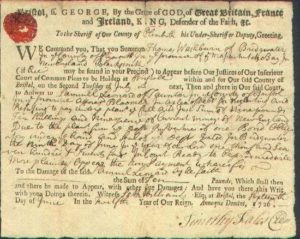 Applying In re: Jorden, 249 S.W.3d 416 (Tex. 2008), which held that a Rule 202 pre-suit deposition was inappropriate in a health care case before service of the appropriate expert report, the Fifth Court held in In re Sandate that third-party discovery was improper for similar reasons, and granted a mandamus petitition to quash it. No. 05-17-00871-CV (Oct. 19, 2017).
Applying In re: Jorden, 249 S.W.3d 416 (Tex. 2008), which held that a Rule 202 pre-suit deposition was inappropriate in a health care case before service of the appropriate expert report, the Fifth Court held in In re Sandate that third-party discovery was improper for similar reasons, and granted a mandamus petitition to quash it. No. 05-17-00871-CV (Oct. 19, 2017).
While Sandate does not directly address the requirement of a lack of adequate remedy by direct appeal, Jorden makes clear that this line of authority is not intended as a general invitation to seek mandamus relief about discovery matters:
Correcting whichever view is wrong after final judgment seems very unlikely, as it is hard to imagine how allowing discovery a little too early could ever be harmful error — either by causing rendition of an improper judgment or preventing the presentation of an appeal. If (as relators claim) Texas law prohibits presuit depositions until an expert report is served, those depositions cannot be “untaken” and thus an appellate court will not be able to cure the error and enforce the statutory scheme after trial. As a result, relators unquestionably may lose substantive and procedural rights if review is postponed, rights the Legislature believed (as discussed below) are critical to ensuring access to affordable medical care in the state.
Sandate does, however, contain a muscular summary of when mandamus relief may issue to address a trial court’s legal error:
In civil cases, “[a] trial or appellate court has no discretion in determining what the law is or inapplying the law to the facts, even if the law is somewhat unsettled.” [Jorden, 249 S.W.3d] at 424 (citing In re Prudential Ins. Co. of Am., 148 S.W.3d 124, 135–36 (Tex. 2004) (orig. proceeding) (case of first impression regarding enforceability of contractual jury waiver); see also Lunsford v. Morris, 746 S.W.2d 471, 473 (Tex. 1988) (orig. proceeding) (changing 100 years of case law and granting mandamus for abuse of discretion when trial judge followed then-existing law), disapproved on other grounds by Walker v. Packer, 827 S.W.2d 833 (Tex. 1992) (orig. proceeding).
 In re Guess provides a basic reminder about the limits of pro se representation and legal services from non-lawyers: “Before the Court is relator’s October 5, 2017 petition for writ of mandamus. Bruce Bryant filed this petition for writ of mandamus as relator’s “authorized representative.” Mr Bryant is not an attorney, is not a party to the litigation and, therefore, cannot file a petition on behalf of relator.” Nos. 05-17-01163-CV et seq. (Oct. 11, 2017) (mem. op.)
In re Guess provides a basic reminder about the limits of pro se representation and legal services from non-lawyers: “Before the Court is relator’s October 5, 2017 petition for writ of mandamus. Bruce Bryant filed this petition for writ of mandamus as relator’s “authorized representative.” Mr Bryant is not an attorney, is not a party to the litigation and, therefore, cannot file a petition on behalf of relator.” Nos. 05-17-01163-CV et seq. (Oct. 11, 2017) (mem. op.)
 The Fifht Court granted mandamus relief against a lawsuit about a student’s discipline by a private school, based on the ecclesiastical abstention doctrine. The Court’s thorough analysis observes: “We acknowledge that the dispute does not expressly concern religious doctrine in all respects. But we also note that [In re: St. Thomas High School, 495 S.W.3d 500, 506 (Tex. App.—Houston [14th Dist.] 2016, orig. proceeding). and [In re: Vida, No. 04-14-00636-CV, 2015 WL 82717, at *2 (Tex. App.—San Antonio Jan. 7, 2015, orig.
The Fifht Court granted mandamus relief against a lawsuit about a student’s discipline by a private school, based on the ecclesiastical abstention doctrine. The Court’s thorough analysis observes: “We acknowledge that the dispute does not expressly concern religious doctrine in all respects. But we also note that [In re: St. Thomas High School, 495 S.W.3d 500, 506 (Tex. App.—Houston [14th Dist.] 2016, orig. proceeding). and [In re: Vida, No. 04-14-00636-CV, 2015 WL 82717, at *2 (Tex. App.—San Antonio Jan. 7, 2015, orig.
proceeding) (mem. op.)] did not do so either. St. Thomas involved the expulsion of a student based on the school handbook. Vida concerned age requirements in the school’s policy manual. And as the St. Thomas court observed, ‘exclusive focus on the presence or absence of an express dispute concerning religious doctrine demonstrates an unduly narrow conception of [the doctrine’s] applicable protections.'” In re Episcopal School of Dallas, No. 05-17-00493-CV (Oct. 11, 2017). The opinion also reviews and rejects a challenge to the mandamus petition based on the doctrine of laches.
 Chase Bank sued a borrower; the threshold question was whether the longer limitations period for a negotiable instrument applied. While Chase sued on a note, the instrument did not qualify as a negotiable instrument because ” the sum-certain requirement is not met unless one can determine from the face of the note the extent of the maker’s liability.” Here, the Note (1) referred to a promise to pay “the total principal amount of $169,573.72 or so much as may be outstanding,” (2) “permit to pay ‘all or any part of the loan evidenced by this Note at any time,'” (3) said that “if prepayments are made, the Bank may apply them “in such order and manner as [the Bank] may from time to time determine in its sole discretion,'” and (4) referred to the “books and records of the Bank” to specify the precise amount owerd. Accordingly: “[b]ecause the Note fails to identify a sum certain on its face, we conclude it is not a negotiable instrument.” JP Morgan Chase v. Robinson & Hoskins, No. 05-17-00087-CV (Oct. 9, 2017) (mem. op.)
Chase Bank sued a borrower; the threshold question was whether the longer limitations period for a negotiable instrument applied. While Chase sued on a note, the instrument did not qualify as a negotiable instrument because ” the sum-certain requirement is not met unless one can determine from the face of the note the extent of the maker’s liability.” Here, the Note (1) referred to a promise to pay “the total principal amount of $169,573.72 or so much as may be outstanding,” (2) “permit to pay ‘all or any part of the loan evidenced by this Note at any time,'” (3) said that “if prepayments are made, the Bank may apply them “in such order and manner as [the Bank] may from time to time determine in its sole discretion,'” and (4) referred to the “books and records of the Bank” to specify the precise amount owerd. Accordingly: “[b]ecause the Note fails to identify a sum certain on its face, we conclude it is not a negotiable instrument.” JP Morgan Chase v. Robinson & Hoskins, No. 05-17-00087-CV (Oct. 9, 2017) (mem. op.)
 Brooks sued CalAtlantic about the construction of a retaining wall; CalAtlantic argued that the suit was barred by the 10-year statute of repose in Tex. Civ. Prac. & Rem. Code § 16.069. The Fifth Court affirmed summary judgment for the defense. Procedurally, the Court concluded that the plaintiff had the burden to establish an exception to the statute once the defendant showed its applicability, citing Ryland Group v. Hood, 924 S.W.2d 120 (Tex, 1996). Substantively, the Court distinguished plaintiff’s authority, observingL “[T]here is no evidence of [defendant’s] awareness that deviating from the Civil Plans could create property defects and dangerous conditions. And neither [cited case] supports Brooks’s contention that proof of deviation from construction plans, alone, is evidence of willful misconduct.” Brooks v. CalAtlantic Homes of Texas, No. 05-16-01203-CV (Oct. 9, 2017) (mem. op.)
Brooks sued CalAtlantic about the construction of a retaining wall; CalAtlantic argued that the suit was barred by the 10-year statute of repose in Tex. Civ. Prac. & Rem. Code § 16.069. The Fifth Court affirmed summary judgment for the defense. Procedurally, the Court concluded that the plaintiff had the burden to establish an exception to the statute once the defendant showed its applicability, citing Ryland Group v. Hood, 924 S.W.2d 120 (Tex, 1996). Substantively, the Court distinguished plaintiff’s authority, observingL “[T]here is no evidence of [defendant’s] awareness that deviating from the Civil Plans could create property defects and dangerous conditions. And neither [cited case] supports Brooks’s contention that proof of deviation from construction plans, alone, is evidence of willful misconduct.” Brooks v. CalAtlantic Homes of Texas, No. 05-16-01203-CV (Oct. 9, 2017) (mem. op.)
 Today’s Dallas Observer has an excellent story about the City of Dallas’s $4 billion back pay dispute with police and firefighters, part of which is set for trial in December 2017 in Collin County. The case involves issues addressed by the Fifth Court in 2002 (yes, 2002) in Arredondo v. City of Dallas, 79 S.W.3d 65 (Tex. App.–Dallas 2002, pet. denied). Specifically, the Court found the word “maintained” to be patently ambiguous as used in this part of a 1978 ordinance: “The current percentage pay differential between grades in the sworn ranks of the Dallas Police Force and the Fire Fighter and Rescue Force shall be maintained.”
Today’s Dallas Observer has an excellent story about the City of Dallas’s $4 billion back pay dispute with police and firefighters, part of which is set for trial in December 2017 in Collin County. The case involves issues addressed by the Fifth Court in 2002 (yes, 2002) in Arredondo v. City of Dallas, 79 S.W.3d 65 (Tex. App.–Dallas 2002, pet. denied). Specifically, the Court found the word “maintained” to be patently ambiguous as used in this part of a 1978 ordinance: “The current percentage pay differential between grades in the sworn ranks of the Dallas Police Force and the Fire Fighter and Rescue Force shall be maintained.”
 Defendant challenged plaintiff’s standing in a dispute about nursing home care, arguing: “The plaintiff must be personally injured—he must plead facts demonstrating that he, himself (rather than a third party or the public at large), suffered the injury.” The Fifth Court agreed, focusing on the pleading at the time of the summary judgment hearing: “Patricia and Delois’s original petition was their pleading on file at the time of the hearing. The original petition does not allege the individual injuries Patricia claims on appeal. Although the prayer in the petition requests that a judgment include $5,000 for “Patricia A. Shaw—Agent Fee’s” [sic] and $39,000 for “Home Health Care[,]” the claims in the original petition concern the economic and physical injuries that Delois suffered. Because Patricia did not plead her individual claims in the original petition, she may not now urge these claims and supporting arguments on appeal.” Shaw v. Daybreak, Inc., No. 05-16-01251-CV (Sept. 20, 2017).
Defendant challenged plaintiff’s standing in a dispute about nursing home care, arguing: “The plaintiff must be personally injured—he must plead facts demonstrating that he, himself (rather than a third party or the public at large), suffered the injury.” The Fifth Court agreed, focusing on the pleading at the time of the summary judgment hearing: “Patricia and Delois’s original petition was their pleading on file at the time of the hearing. The original petition does not allege the individual injuries Patricia claims on appeal. Although the prayer in the petition requests that a judgment include $5,000 for “Patricia A. Shaw—Agent Fee’s” [sic] and $39,000 for “Home Health Care[,]” the claims in the original petition concern the economic and physical injuries that Delois suffered. Because Patricia did not plead her individual claims in the original petition, she may not now urge these claims and supporting arguments on appeal.” Shaw v. Daybreak, Inc., No. 05-16-01251-CV (Sept. 20, 2017).
My partner Britta Stanton recently published a good article – “Who’s Your Client? The Business or the Executive?”‘ about the importance of quality Upjohn warnings – worth a read if your practice involves the depositions of company executives.
 Arising from what the Fifth Court described as a “motion [that] has been pending for nearly five years without ruling,” it found that “[t]he trial court has had more than a reasonable time to rule, and relator has done what is require to obtain a ruling on the motion.” Accordingly, it granted mandamus relief, observing that “[a]mong the criteria included are the trial court’s actual knowledge of the motion, its overt refusal to act, the state of the court’s docket, and the existence of other judicial and administrative matters which must be addressed first.” Also, while the petitioner asked the the trial court not only consider his motion to reconsider but also direct that it be granted, the Court observed: “We deny that request because, while we have jurisdiction to direct the trial court to exercise its discretion, we are not permitted to tell the trial court how to rule on the motion.” In re Owens, No. 05-17-00919-CV (Sept. 25, 2017) (mem. op.)
Arising from what the Fifth Court described as a “motion [that] has been pending for nearly five years without ruling,” it found that “[t]he trial court has had more than a reasonable time to rule, and relator has done what is require to obtain a ruling on the motion.” Accordingly, it granted mandamus relief, observing that “[a]mong the criteria included are the trial court’s actual knowledge of the motion, its overt refusal to act, the state of the court’s docket, and the existence of other judicial and administrative matters which must be addressed first.” Also, while the petitioner asked the the trial court not only consider his motion to reconsider but also direct that it be granted, the Court observed: “We deny that request because, while we have jurisdiction to direct the trial court to exercise its discretion, we are not permitted to tell the trial court how to rule on the motion.” In re Owens, No. 05-17-00919-CV (Sept. 25, 2017) (mem. op.)
 At issue in Galaxy Builers, Ltd. v. Globus Management Group was a trial court order denying enforcemement of an arbitrator’s subpoena. While the order said that it was
At issue in Galaxy Builers, Ltd. v. Globus Management Group was a trial court order denying enforcemement of an arbitrator’s subpoena. While the order said that it was  final, section 171.098 of the Texas Arbitration Act does not list it as an appealable category of arbitration-related ruling; thus, the appeal was dismissed for lack of jurisdiction. No. 05-17-00831-CV (Oct. 2, 2017) (mem. op.)
final, section 171.098 of the Texas Arbitration Act does not list it as an appealable category of arbitration-related ruling; thus, the appeal was dismissed for lack of jurisdiction. No. 05-17-00831-CV (Oct. 2, 2017) (mem. op.)
 Among other holdings related to the arbitrability of a dispute between a business and a former employee, the Fifth Court rejected an argument that the defendant business had waived its right to invoke arbitration: “In short, many factors weigh against a waiver finding: (i) Tantrum is the defendant, not the plaintiff, (ii) Tantrum’s delay in seeking arbitration was not extreme, and Carson has not shown an improper reason for the delay, (iii) Tantrum did not seek a merits disposition of Carson’s claims, and it did not conduct an inordinate amount of discovery, (iv) Tantrum’s counterclaims are arguably compulsory counterclaims, (v) Carson did not show that the parties have spent an inordinate amount of time or money litigating this case, and (vi) Carson did not show that the discovery Tantrum conducted would have been unavailable in arbitration or would not be useful in the arbitration.” Tantrum Street LLC v. Carson, No. 05-16-01096-CV (July 24, 2017).
Among other holdings related to the arbitrability of a dispute between a business and a former employee, the Fifth Court rejected an argument that the defendant business had waived its right to invoke arbitration: “In short, many factors weigh against a waiver finding: (i) Tantrum is the defendant, not the plaintiff, (ii) Tantrum’s delay in seeking arbitration was not extreme, and Carson has not shown an improper reason for the delay, (iii) Tantrum did not seek a merits disposition of Carson’s claims, and it did not conduct an inordinate amount of discovery, (iv) Tantrum’s counterclaims are arguably compulsory counterclaims, (v) Carson did not show that the parties have spent an inordinate amount of time or money litigating this case, and (vi) Carson did not show that the discovery Tantrum conducted would have been unavailable in arbitration or would not be useful in the arbitration.” Tantrum Street LLC v. Carson, No. 05-16-01096-CV (July 24, 2017).
 The forum selection clause in In re Atos IT Solutions said: “If the Dispute cannot be resolved by Customer and Supplier in accordance with Clause 32.1[the Mandatory ADR Process], the Parties irrevocably agree that the Courts of England shall have exclusive jurisdiction . . . .” “The use of the term ‘if’ connotes a condition precedent that conditions performance rather than a covenant or promise.” (quoting Shin-Con Dev. Corp. v. I.P. Invs., Ltd., 270 S.W.3d 759, 766–67 (Tex. App.—Dallas 2008, pet. denied)). The trial court received evidence about whether that condition had been satisfied here, concluded that it had not, and the Fifth Court thus found no abuse of discretion in the resulting ruling. No. 05-17-00952-CV (Aug. 18, 2017) (mem. op.).
The forum selection clause in In re Atos IT Solutions said: “If the Dispute cannot be resolved by Customer and Supplier in accordance with Clause 32.1[the Mandatory ADR Process], the Parties irrevocably agree that the Courts of England shall have exclusive jurisdiction . . . .” “The use of the term ‘if’ connotes a condition precedent that conditions performance rather than a covenant or promise.” (quoting Shin-Con Dev. Corp. v. I.P. Invs., Ltd., 270 S.W.3d 759, 766–67 (Tex. App.—Dallas 2008, pet. denied)). The trial court received evidence about whether that condition had been satisfied here, concluded that it had not, and the Fifth Court thus found no abuse of discretion in the resulting ruling. No. 05-17-00952-CV (Aug. 18, 2017) (mem. op.).
A tip of the hat to sister blog 600Camp.com, which celebrates its sixth birthday today!
 The plaintiff in B.C. v. Steak & Shake filed her summary judgment response a day late. The panel majority rejected her argument that the trial court had accepted the filing by including this language in the order granting summary judgment: “After considering the pleadings, evidence, and arguments of counsel, the Court finds that the Motion should be granted.” Accordingly, because the record lacked an “affirmative indication” that it considered the late-filed evidence or granted leave to file it, the majority presumed that the trial court had not considered it. The majority and a dissent disagreed on whether the Court “may consider [plaintiff’s] appellate issues that assert the legal insufficiency of [defendant’s] motion for summary judgment.” No. -5-14-00649-CV (Aug. 30, 2017).
The plaintiff in B.C. v. Steak & Shake filed her summary judgment response a day late. The panel majority rejected her argument that the trial court had accepted the filing by including this language in the order granting summary judgment: “After considering the pleadings, evidence, and arguments of counsel, the Court finds that the Motion should be granted.” Accordingly, because the record lacked an “affirmative indication” that it considered the late-filed evidence or granted leave to file it, the majority presumed that the trial court had not considered it. The majority and a dissent disagreed on whether the Court “may consider [plaintiff’s] appellate issues that assert the legal insufficiency of [defendant’s] motion for summary judgment.” No. -5-14-00649-CV (Aug. 30, 2017).
 The Texas exemplary damages statute (specifically, TCPRC § 41.008(b)) imposes the following cap: “Exemplary damages awarded against a defendant may not exceed an amount equal to the greater of: (1) (A) two times the amount of economic damges; plus (B) an amount equal to any noneconomic damages found by the jury, not to exceed $750,000 . . . ” It further defines “economic damages” as “compensatory damages intended to compensate a claimant for actual economic or pecuniary loss; the term does not include exemplary damages or noneconomic damages.”
The Texas exemplary damages statute (specifically, TCPRC § 41.008(b)) imposes the following cap: “Exemplary damages awarded against a defendant may not exceed an amount equal to the greater of: (1) (A) two times the amount of economic damges; plus (B) an amount equal to any noneconomic damages found by the jury, not to exceed $750,000 . . . ” It further defines “economic damages” as “compensatory damages intended to compensate a claimant for actual economic or pecuniary loss; the term does not include exemplary damages or noneconomic damages.”
The panel majority in Goodyear Tire & Rubber Co. v. Rogers concluded that “economic damages in this statute are existing in fact, real monetary losses like lost wages, the cost to obtain services that another previously provided for free or at a lower cost, or that the defendant’s misconduct compelled the claimant to seek out.” A dissent objected to the application of this standard to testimony about loss resulting from a relative’s death, noting: “These pecuniary losses are not subject to precise mathemetical calculation, but . . . ‘the inherent uncertianty in measuring these losses does not make them “non-economic in nature.”‘ Nor does this inherent uncertainty mean the loss is not an actual pecuniary loss. No. 05-15-00001-CV (Aug. 31, 2017).
 The Fifth Court found this forum selection clause mandatory and unambiguous: “Any lawsuit relating to any matter arising under this agreement shall be initiated in a State or Federal Court located in San Jose, California.” An attempt to avoid the contract provision by relying upon tort claims failed under Pinto Technology Ventures v. Sheldon (Tex. May 19, 2017): “Dynasty’s claims arise from the business relationship that was struck through the agreements and will require review and interpretation of the agreements by the trial court or trier of fact for Dynasty to prevail. On this record, a but for relationship is evidence between the claims asserted below and the Business Agreement.” In re Bambu Franchising, No. 05-17-00690-CV (Sept. 12, 2017) (mem. op.)
The Fifth Court found this forum selection clause mandatory and unambiguous: “Any lawsuit relating to any matter arising under this agreement shall be initiated in a State or Federal Court located in San Jose, California.” An attempt to avoid the contract provision by relying upon tort claims failed under Pinto Technology Ventures v. Sheldon (Tex. May 19, 2017): “Dynasty’s claims arise from the business relationship that was struck through the agreements and will require review and interpretation of the agreements by the trial court or trier of fact for Dynasty to prevail. On this record, a but for relationship is evidence between the claims asserted below and the Business Agreement.” In re Bambu Franchising, No. 05-17-00690-CV (Sept. 12, 2017) (mem. op.)
 Omnicare and Remarkable had four contracts, all with a forum selection clause which said that Delaware state and federal courts had jurisdiction “to the exclusion of any and all other possible venues.” Remarkable sued Omnicare in four separate Texas counties (one suit per contract); the parties agreed to consolidate them in Dallas, and signed a Rule 11 agreement to do so which said that Omnicare agreed to “waive any objections they may have to venue over the claims against them being in Dallas County.” Omnicare then moved to dismiss, based on the contractual forum selection clause. The Fifth Court conditionally granted mandamus relief in favor of Omnicare, finding that the Rule 11 agreement addressed “venue” – the locale within the Texas system – as opposed to “forum” – the locale outside that system. In re Omnicare Pharmacy, No. 05-17-00246-CV (Aug. 31, 2017).
Omnicare and Remarkable had four contracts, all with a forum selection clause which said that Delaware state and federal courts had jurisdiction “to the exclusion of any and all other possible venues.” Remarkable sued Omnicare in four separate Texas counties (one suit per contract); the parties agreed to consolidate them in Dallas, and signed a Rule 11 agreement to do so which said that Omnicare agreed to “waive any objections they may have to venue over the claims against them being in Dallas County.” Omnicare then moved to dismiss, based on the contractual forum selection clause. The Fifth Court conditionally granted mandamus relief in favor of Omnicare, finding that the Rule 11 agreement addressed “venue” – the locale within the Texas system – as opposed to “forum” – the locale outside that system. In re Omnicare Pharmacy, No. 05-17-00246-CV (Aug. 31, 2017).
Football legend Deion Sanders sued his ex-wife for defamation; the trial court granted summary judgment on liability and entered judgment for $2.2 million after a bench trial on 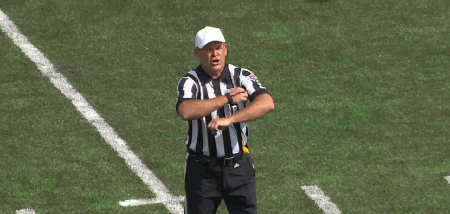 damages. The Fifth Court reversed, holding that this testimony was too conclusory to justify a summary judgment on the issue of malice:
damages. The Fifth Court reversed, holding that this testimony was too conclusory to justify a summary judgment on the issue of malice:
“At the hearing, Deion was asked, ‘Does Pilar Sanders know that these statements are untrue,’ and he answered ‘Yes.’ In his affidavit, Deion stated, ‘Defendant knew or should have known that each of the defamatory statements . . . were [sic] false . . . I have previously so testified.”
Finding no other evidence or argument sufficient to sustain the judgment as to malice, the Court remanded. Sanders v. Sanders, No. 05-16-00248-CV (Aug. 29, 2017) (mem. op.)
The trial court dismissed Williams’s lawsuit for want of prosecution. Williams moved to reinstate, triggering Tex. R. Civ. P. 165a(3), which requires the court to “set a hearing on the motion as soon as practicable.” The trial court did not do so, and reversal resulted because under the language of this rule, “the trial court has no discretion to fail to hold a hearing.” Williams v. Moreno, No. 05-16-01114-CV (Sept. 7, 2017) (mem. op.) While arising from direct appeal rather than a petition for mandamus, this outcome is a useful reminder as to other such mandatory rules.
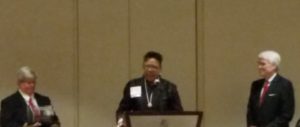 Last week, the Supreme Court of Texas Historical Society gave its annual Jack Pope Professionalism Award to Hon. Carolyn Wright, Chief Justice of the Dallas Court of Appeals. Wonderful recognition for a distinguished public servant.
Last week, the Supreme Court of Texas Historical Society gave its annual Jack Pope Professionalism Award to Hon. Carolyn Wright, Chief Justice of the Dallas Court of Appeals. Wonderful recognition for a distinguished public servant.
 If your opponent makes unclear arguments on appeal, after a bench trial with detailed findings of fact and conclusions of law, the opinion of Pelley v. Wynne, No. 05-15-01560-CV (Aug. 28, 2017) (mem. op.), reminds of two principles to bring clarity:
If your opponent makes unclear arguments on appeal, after a bench trial with detailed findings of fact and conclusions of law, the opinion of Pelley v. Wynne, No. 05-15-01560-CV (Aug. 28, 2017) (mem. op.), reminds of two principles to bring clarity:
- “When a party’s issue globally attacks the trial court’s findings of fact and there is no method to ascertain the appellant’s true objection to the sufficiency of the evidence, the findings of fact issued by the trial court are binding on the trial
 court.” (“However, the binding nature of the trial court’s findings of fact does not prevent an appellate court from reviewing the conclusions drawn from those factual findings.”)
court.” (“However, the binding nature of the trial court’s findings of fact does not prevent an appellate court from reviewing the conclusions drawn from those factual findings.”) - An attack on a conclusion of law, as required by Tex. R. App. P. 38.1(i), must “contain a clear and concise argument for the contentions made, wiith appropriate citations to authorities and to the record.”
 I am speaking at the Texas State Bar’s “Civil Appellate Practice 101” course on September 6 in Austin about key differences in procedural issues between Texas courts and federal courts in the Fifth Circuit. Here is a copy of the PowerPoint that I am using.
I am speaking at the Texas State Bar’s “Civil Appellate Practice 101” course on September 6 in Austin about key differences in procedural issues between Texas courts and federal courts in the Fifth Circuit. Here is a copy of the PowerPoint that I am using.
 In the recent family law case of In re: B.W.S., this memorandum was held to not start the running of appellate deadlines; the Court notedd (among other things) how the parties reacted:
In the recent family law case of In re: B.W.S., this memorandum was held to not start the running of appellate deadlines; the Court notedd (among other things) how the parties reacted:
When a document such as the Memorandum here instructs the parties to prepare an appropriate final order, this is evidence that the trial court did not intend the document to be a final judgment. This is supported further by the fact the trial court signed the Final Order in this case three months later. Additionally, the parties did not treat the Memorandum as a final judgment below. Mother did not file post-judgment motions after the court sent the Memorandum; she filed them after the trial court signed the Final Order. And even though Father argues on appeal that the Memorandum was the final judgment, he did not argue that below, and he also filed a motion asking the court to sign a final order.
No. 05-15-01207-CV (Nov. 28, 2016) (mem. op.) (citation omitted). In contrast, in the recent family law case of In re B.D., a similar memorandum was held to constitute a judgment and start the running of appellate deadlines; discounting (among other things) how the parties reacted to it:
“Despite the trial court’s hearings to consider appellee’s motion to sign an order and its subsequent order, we conclude the memorandum substantially complies with the requisites of a formal judgment to be accorded final judgment status triggering the appellate deadline.”
No. 05-17-00674-CV (Aug. 31, 2017).
The key distinction between these opinions seems to be the inclusion of express language that the memorandum is not intended as a judgment, and that requests the parties to prepare draft judgments. This practice echoes the general custom endorsed by Lehmann v. Har-Con Corp., 39 S.W.3d 191 (Tex. 2001), of including “language of finality” in a ruling intended to be a final judgment. Of course, even under Lehmann, the substance controls rather than the “magic words,” so this area looks to be one that will continue to pose practical challenges. (SPECIAL THANKS to Hon. Emily Miskel of the 470th District Court in Collin County, who alerted me to these cases on her informative Twitter feed.)
Five Tips for Hurricane Harvey Litigation (a version of this article is in this week’s Texas Lawbook)
In the course of reviewing the Fifth Circuit’s commercial cases for the 600 Camp blog, I have read many opinons about disputes arising from Hurricane Katrina cases. In light of the havoc recently created by Hurricane Harvey, I wanted to share five observations to prepare for the litigation that will inevitably result.
- Record the facts.
Any lawsuit creates tension between the past and the future. The parties want to move on, and put the expense and stress of litigation behind them. But the legal case forces them to revisit the past.
That tension is particularly acute after a disaster such as Harvey, which forced people and businesses to endure incredible stress, while making them then revisit that trauma to protect their legal rights in court. The – entirely understandable – desire to move on, must be squared with the need to take the time to preserve evidence.
Consider St. Bernard Parish v. Lafarge North America, a case about the destruction of a bridge during Hurricane Katrina. While the parties offered extensive expert testimony about what caused the damage, the summary judgment proceedings turned in no small part on the facts of what happened during the storm, including facts established by photographs.
A party facing litigation should consider – as awkward as it can be while recovering from a life-disrupting event – what facts seem obvious now but may fade from memory as time goes on. To the extent possible, some thought should be given to:
- maintaining electronic records, even if the hardware appears damaged at first blush;
- writing down a “log” of relevant conversations and events about important events;
- storing any relevant physical objects, for potential future analysis by experts; and
- simply writing down basic information about names, addresses, phone numbers, and the like.
In a case arising from a natural disaster, courts will likely be forgiving as to claims of spoliation. But lost information is lost, and its absence can later effect the resolution of a legal case.
- Help the people.
The fact evidence in the Lafarge case also included eyewitness testimony, which proved critical to defeating the defendant’s summary judgment motion. Just as a photograph can deteriorate, a person’s memory can fade. And the likelihood of that occurring can only increase when the person is placed under the severe stress of a natural disaster.
Any “team” confronted with a legal challenge by Harvey – a business, a professional organization, or even a family – should be mindful of the psychological effects of that stress, and encourage counseling for depression, substance abuse, and other such problems when their first signs appear. Of course, that is a good practice in any event. But its potential side benefit to a legal case is real and worth remembering.
- Remember three definitions.
The factual and legal issues that will ultimately go to trial in cases about Harvey simply cannot be predicted with any specificity. But in the short run, three basic legal concepts are likely to pervade business dealings related to the storm:
- The Texas pattern jury instruction about “duress” defines it as “the mental, physical, or economic coercion of another, causing that party to act contrary to his free will and interest.”
- While “force majeure” is ordinarily defined by a specific contract, it generally refers to an “extraordinary event or circumstance beyond the control of the parties,” and often does not excuse a party’s non-performance entirely, but only suspends it for the duration of the event.
- “Impossibility of performance” is defined by the Restatement (Second) of Contracts as occurring “[w]here, after a contract is made, a party’s performance is made impracticable without his fault by the occurrence of an event the non-occurrence of which was a basic assumption on which the contract was made, his duty to render that performance is discharged, unless the language or the circumstances indicate the contrary.”
Awareness of these concepts can potentially avoid problems down the road, as well as identify topics and issues that require special attention today.
- “Two-deep leadership.”
The Boy Scouts of America strictly follows a policy of “two-deep leadership,” under which two adults should be present at all times when interacting with youth. One benefit of that policy is to avoid “he-said, she-said” disputes between two eyewitnesses with no third–party corroboration. In the stress of dealing with the aftermath of Harvey, involving a business colleague or a friend in important discussions may help the future resolution of a legal matter, if a dispute arises about what was said in those discussions.
- Crowdsource, wisely.
For good or ill, social media has come a long way since Hurricane Katrina. Used judiciously, it can be a good source of information about late-breaking news or the reputation of a particular business. And it can provide a valuable outlet for self-expression after the trauma of Harvey.
But social media posts can survive much longer than the thoughts that prompted them, and rash comments about people or events can come back to haunt the person who makes an ill-advised post. Social media is a valuable conduit for information, and at the same time, it is a reliable creator and collector of potential evidence.
Conclusion
Faced with the reality of recovery from one of the worst storms in the nation’s history, planning for future litigation may seem to be a distant worry. But the foundation for that litigation is being put in place today, intentionally or unintentionally. These five basic ideas may provide ways to place that foundation in a more orderly manner, resulting in a stronger end product.
 The Discovery Channel may have has Shark Week, but the Fifth Court is having Mandamus Week. The most recent installment is In re: Commercial Metals, which involved a challenge to a protective order about a business’s trade secrets. The Court began by reminding, as to the basic requriements for a writ of mandamus, that “[a] trial court abuses its discretion if it orders discovery exceeding the scope permitted by the rules,” and that “[n]o adequate appellate remedy exists when the trial court compels production beyond the permissible bounds of discovery.” That said, the Court found no abuse of discretion in the particularized procedures used to limit use of the information by plaintiff’s “de facto in house counsel,” and denied the petition. The opinion provides useful guidance on a very practical and recurring issue in business disputes about the use of confidential information. No. 05-16-01214-CV (Aug. 29, 2017) (mem. op.)
The Discovery Channel may have has Shark Week, but the Fifth Court is having Mandamus Week. The most recent installment is In re: Commercial Metals, which involved a challenge to a protective order about a business’s trade secrets. The Court began by reminding, as to the basic requriements for a writ of mandamus, that “[a] trial court abuses its discretion if it orders discovery exceeding the scope permitted by the rules,” and that “[n]o adequate appellate remedy exists when the trial court compels production beyond the permissible bounds of discovery.” That said, the Court found no abuse of discretion in the particularized procedures used to limit use of the information by plaintiff’s “de facto in house counsel,” and denied the petition. The opinion provides useful guidance on a very practical and recurring issue in business disputes about the use of confidential information. No. 05-16-01214-CV (Aug. 29, 2017) (mem. op.)
 Six tenants intervened in a code enforcement action, seeking to pursue class claims against the property owners. Defendants sought to take their depositions about issues regarding certification, the intervenors moved to quash, and the trial judge allowed the depositions to
Six tenants intervened in a code enforcement action, seeking to pursue class claims against the property owners. Defendants sought to take their depositions about issues regarding certification, the intervenors moved to quash, and the trial judge allowed the depositions to  proceed, but for no more than thirty minutes each. The Fifth Court granted mandamus, finding that “the record includes no evidence or even argument regarding how a deposition of any length wqould cause intervenors to suffer harm or subject them to undue burden,” and also that the intervenors “lack an adequate remedy by appeal because the order severely compromises relators’ ability to present its case on the issue of class certification.” In re: Topletz, No. 05-17-00315-CV (Aug. 24, 2017).
proceed, but for no more than thirty minutes each. The Fifth Court granted mandamus, finding that “the record includes no evidence or even argument regarding how a deposition of any length wqould cause intervenors to suffer harm or subject them to undue burden,” and also that the intervenors “lack an adequate remedy by appeal because the order severely compromises relators’ ability to present its case on the issue of class certification.” In re: Topletz, No. 05-17-00315-CV (Aug. 24, 2017).
 In a forceful statement against merits discovery before the resolution of a special appearance, the Fifth Court granted a writ of mandamus to require that “relator’s deposition be limited to matters directly relevant to the issue of jurisdiction if the deposition is taken before the trial court rules on relator’s special appearance,” because “Rule 120a requires discovery be limited to matters relevant to jurisdiciton prior to a ruling on a special appearance.” In re: Stanton, No. 05-17-00834-CV (Aug. 24, 2017) (mem. op.) (citing, inter alia, In re: Doe, 444 S.W.3d 603, 608 (Tex. 2014)).
In a forceful statement against merits discovery before the resolution of a special appearance, the Fifth Court granted a writ of mandamus to require that “relator’s deposition be limited to matters directly relevant to the issue of jurisdiction if the deposition is taken before the trial court rules on relator’s special appearance,” because “Rule 120a requires discovery be limited to matters relevant to jurisdiciton prior to a ruling on a special appearance.” In re: Stanton, No. 05-17-00834-CV (Aug. 24, 2017) (mem. op.) (citing, inter alia, In re: Doe, 444 S.W.3d 603, 608 (Tex. 2014)).
 A law firm and its landlord sued one another; the landlord sought unpaid rent, while the firm sought recovery of moving expenses after air conditioning problems with the building became intolerable. The firm won, and as a result defeated the rent claim, but its damages were set aside by the Fifth Court because the firm did not establish their reasonableness: “In sum, there is no evidence that the cost to procure the new office space (such as the deposit) or to equip it (such as the new telephone system) was reasonable. There is no evidence that the direct moving expenses were reasonable. There is no evidence that the miscellaneous expenses, such as the payments for meals, gasoline, and recycling fees, were reasonable. The only evidence about the expenses is the bare fact that they were paid.” 701 Katy Building, LP v. John Wheat Gibson, P.C., No. 05-16-00193-CV (Aug. 24, 2017) (mem. op.)
A law firm and its landlord sued one another; the landlord sought unpaid rent, while the firm sought recovery of moving expenses after air conditioning problems with the building became intolerable. The firm won, and as a result defeated the rent claim, but its damages were set aside by the Fifth Court because the firm did not establish their reasonableness: “In sum, there is no evidence that the cost to procure the new office space (such as the deposit) or to equip it (such as the new telephone system) was reasonable. There is no evidence that the direct moving expenses were reasonable. There is no evidence that the miscellaneous expenses, such as the payments for meals, gasoline, and recycling fees, were reasonable. The only evidence about the expenses is the bare fact that they were paid.” 701 Katy Building, LP v. John Wheat Gibson, P.C., No. 05-16-00193-CV (Aug. 24, 2017) (mem. op.)
 The Fifth Court rejected the exercise of personal jurisdiction in Texas over a Mexican reinsurance broker in Cooper Gay Martinez del Rio y Asociados v. Elamex, S.A. de C.V., holding: “Cornerstone [Healthcare Group Holding, Inc. v. Nautic Management, 493 S.W.3d 65 (2016)] is distinguishable. CGM did not spearhead or direct appellees’ purchase of the Policy. CGM did not seek out appellees in Texas, insure appellees’ Texas assets, or seek to profit from business in Texas. Further, unlike in Cornerstone, there is no evidence CGM was created for or created subsidiary entities for the purpose of conducting business in Texas, and appellees do not allege this occurred. Rather, Elamex, a Mexican entity, contacted HUB, which began a chain of communications eventually leading to CGM, to find an insurer for its properties. Afirme, a Mexican entity that provided that Policy, sought reinsurance through CGM and paid a commission to CGM. At no point did CGM seek out a Texas company or Texas assets in order to benefit, profit, or take advantage of Texas such that it impliedly consented to suit here.” No. 05-16-01436-CV (Aug. 22, 2017) (mem. op.)
The Fifth Court rejected the exercise of personal jurisdiction in Texas over a Mexican reinsurance broker in Cooper Gay Martinez del Rio y Asociados v. Elamex, S.A. de C.V., holding: “Cornerstone [Healthcare Group Holding, Inc. v. Nautic Management, 493 S.W.3d 65 (2016)] is distinguishable. CGM did not spearhead or direct appellees’ purchase of the Policy. CGM did not seek out appellees in Texas, insure appellees’ Texas assets, or seek to profit from business in Texas. Further, unlike in Cornerstone, there is no evidence CGM was created for or created subsidiary entities for the purpose of conducting business in Texas, and appellees do not allege this occurred. Rather, Elamex, a Mexican entity, contacted HUB, which began a chain of communications eventually leading to CGM, to find an insurer for its properties. Afirme, a Mexican entity that provided that Policy, sought reinsurance through CGM and paid a commission to CGM. At no point did CGM seek out a Texas company or Texas assets in order to benefit, profit, or take advantage of Texas such that it impliedly consented to suit here.” No. 05-16-01436-CV (Aug. 22, 2017) (mem. op.)
 In the fifth appellate proceeding about payment of attorneys’ fees in the prosecution of Attorney General Paxton, the Fifth Court disapproved of a local rule that allowed a judge to depart from the standing fee schedule in particular cases (and thus here, for the payment of the prosecutors pro tem in the Paxton matter): “Rule 4.01B thwarts what we perceive to be the objectives of the [applicable] statute, which are to ensure by means of a duly adopted schedule that (1) appointed attorneys––in this case the prosecutors pro tem––are paid a fair, but not excessive, fee and (2) the commissioners court, which is tasked with the responsibility of settling and directing payments of accounts against the county, can more accurately project the expenses of a fiscal year and budget accordingly. By adopting local rule 4.01B, the Collin County judges partially abdicated to the individual judges the responsibility delegated to them collectively to determine the reasonable fee for appointed counsel and rendered illusory the legislative requirement of setting and applying a fee schedule.” In re Collin County, Texas, County Commissioners, No. 05-17-00634-CV et seq. (Aug. 21, 2017).
In the fifth appellate proceeding about payment of attorneys’ fees in the prosecution of Attorney General Paxton, the Fifth Court disapproved of a local rule that allowed a judge to depart from the standing fee schedule in particular cases (and thus here, for the payment of the prosecutors pro tem in the Paxton matter): “Rule 4.01B thwarts what we perceive to be the objectives of the [applicable] statute, which are to ensure by means of a duly adopted schedule that (1) appointed attorneys––in this case the prosecutors pro tem––are paid a fair, but not excessive, fee and (2) the commissioners court, which is tasked with the responsibility of settling and directing payments of accounts against the county, can more accurately project the expenses of a fiscal year and budget accordingly. By adopting local rule 4.01B, the Collin County judges partially abdicated to the individual judges the responsibility delegated to them collectively to determine the reasonable fee for appointed counsel and rendered illusory the legislative requirement of setting and applying a fee schedule.” In re Collin County, Texas, County Commissioners, No. 05-17-00634-CV et seq. (Aug. 21, 2017).
 A new and important issue in Texas procedure has been the amount of detail required of a trial court in granting a motion for new trial. In the case of In re: BCH Development, the Dallas Court of Appeals reversed such an order, carefully laying out the framework for appellate review:
A new and important issue in Texas procedure has been the amount of detail required of a trial court in granting a motion for new trial. In the case of In re: BCH Development, the Dallas Court of Appeals reversed such an order, carefully laying out the framework for appellate review:
- The trial court’s reasons for a new trial must be both sufficiently specific and legally appropriate (satisfied here, where the court identified specific issues involving violation of limine orders, improper jury argument, and evidentiary sufficiency);
- Those reasons must be valid and correct. Here, (a) as to the limine order, the Fifth Court either found no violaton or a cure; (b) no incurably improper jury argument (and thus a waiver when there was not a contemporaneous objection); and (c) sufficient evidence on the issue of attorneys’ fees, noting that the amount awarded by the jury was “well within the range supported by” the testimony.
Accordingly, the Court conditionally granted the requested writ of mandamus. No. 05-16-01481-CV (Aug. 15, 2017).
 The parties’ dispute resolution provision said: “If the Dispute cannot be resolved by Customer and Supplier in accordance with Clause 32.1 [the Mandatory ADR Process], the Parties irrevocably agree that the Courts of England shall have exclusive jurisdiction.” Acknowledging that a writ of mandamus is potentialy available to enforce a forum selection clause, the Fifth Court denied the petitioners’ application here. Procedurally, “[b]oth parties presented evidence as to whether they engaged in the mandatory ADR process.” Legally, “The use of the term ‘if’ connotes a condition precedent that conditions performance rather than a covenant or promise.” Accordingly “[u]nder this record, the trial court did not clearly fail to analyze or apply the law correctly and, thus, did not abuse its discretion.” In re Atos IT, No. 05-17-00952-CV (Aug. 18, 2017) (mem. op.)
The parties’ dispute resolution provision said: “If the Dispute cannot be resolved by Customer and Supplier in accordance with Clause 32.1 [the Mandatory ADR Process], the Parties irrevocably agree that the Courts of England shall have exclusive jurisdiction.” Acknowledging that a writ of mandamus is potentialy available to enforce a forum selection clause, the Fifth Court denied the petitioners’ application here. Procedurally, “[b]oth parties presented evidence as to whether they engaged in the mandatory ADR process.” Legally, “The use of the term ‘if’ connotes a condition precedent that conditions performance rather than a covenant or promise.” Accordingly “[u]nder this record, the trial court did not clearly fail to analyze or apply the law correctly and, thus, did not abuse its discretion.” In re Atos IT, No. 05-17-00952-CV (Aug. 18, 2017) (mem. op.)
I was interviewed today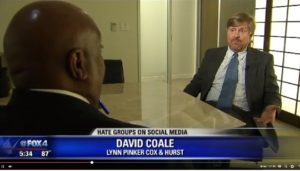 by Fox 4 Dallas about social media and hate speech, in light of recent events in Charlottesville.
by Fox 4 Dallas about social media and hate speech, in light of recent events in Charlottesville.
Five LPCH attorneys are on the 2018 list of Best Lawyers in America!
 Two important concepts about personal jurisdiction were at issue in Celanese Corp. v. Salcedo Sahagun, a case about “Mexican nationals’ use of a Washington, D.C. publicist to disseminate defamatory statements directed at Texas and other markets as part of a national media campaign . . . .” The resolution of those questions turned in no small part on the nuances of how they were defined. The first question was whether a publicist was an agent (and thus, creating imputation) as opposed to an independent contractor; its resolution turned on whether the defendants “retained control over [her] manner and means of performance — regardless of whether they chose to exercise that right.” The second involved the reconciliation of cases applying Calder v. Jones; the Court approached that issue by focusing on “whether [defendants] intended to benefit from having the statements distributed in Texas, regardless of the route taken to get them there.” No. 05-16-00868-CV (Aug. 9, 2017) (mem. op.)
Two important concepts about personal jurisdiction were at issue in Celanese Corp. v. Salcedo Sahagun, a case about “Mexican nationals’ use of a Washington, D.C. publicist to disseminate defamatory statements directed at Texas and other markets as part of a national media campaign . . . .” The resolution of those questions turned in no small part on the nuances of how they were defined. The first question was whether a publicist was an agent (and thus, creating imputation) as opposed to an independent contractor; its resolution turned on whether the defendants “retained control over [her] manner and means of performance — regardless of whether they chose to exercise that right.” The second involved the reconciliation of cases applying Calder v. Jones; the Court approached that issue by focusing on “whether [defendants] intended to benefit from having the statements distributed in Texas, regardless of the route taken to get them there.” No. 05-16-00868-CV (Aug. 9, 2017) (mem. op.)
 Congrats to my LPCH law partner Liz Ryan for a solid win in a forum dispute.
Congrats to my LPCH law partner Liz Ryan for a solid win in a forum dispute.
Krueger brought tort claims against his former employer, Pulse Evolution Corp. The first sentence of the dispute resolution clause in his employment agreement said that “[a]ny dispute under this Agreement shall be arbitrated” in Palm Beach County, Florida. The forum selection clause, found much later in the long paragraph, said, “In the event that arbitration
cannot be compelled or in order to enforce arbitration,” exclusive jurisdiction lies in Port St.Lucie County, Florida. Krueger argued that the “under this Agreement” clause impliedly carried into the forum selection provision, but the Fifth Court disagreed:
“The modifying language ‘under this Agreement’ is found only in the arbitration clause, which is the first sentence of paragraph 25. The forum selection clause, found in lines 27–30 of paragraph 25, states that it applies to disputes in which arbitration cannot be compelled. Additionally, each clause selects a different county in Florida as the forum for dispute resolution. To give meaning to both the arbitration clause and the forum selection clause, the forum selection clause must refer to disputes that are not subject to the arbitration clause, that is, disputes that do not arise ‘under this Agreement.’ If the parties wanted this modifying language to apply to the forum selection clause, they could have said so.”
Krueger v. Pulse Evolution Corp., No. 05-16-00922-CV (July 21, 2017).
 In a topic also addressed on 600Camp today, the interplay of criminal proceedings and civil litigation can be challenging. The conclusion of Dunne v. Brinker Texas, Inc. summarizes one potential result: “Under the particular facts of this case, the only possible remedial measure that could have protected Dunne’s Fifth Amendment privilege was an abatement. But an abatement could not cure the prejudice Chili’s had already suffered from being unable to identify fact witnesses for the more than a year that had passed since it first requested that information. In addition, there was no indication how long the case might sit in limbo, when trial might be, and whether Dunne would continue to assert his Fifth Amendment rights in the event of an appeal. We conclude the trial court did not abuse its discretion in striking Dunne’s pleadings and therefore affirm.” No. 05-16-00496-CV (Aug. 10, 2017).
In a topic also addressed on 600Camp today, the interplay of criminal proceedings and civil litigation can be challenging. The conclusion of Dunne v. Brinker Texas, Inc. summarizes one potential result: “Under the particular facts of this case, the only possible remedial measure that could have protected Dunne’s Fifth Amendment privilege was an abatement. But an abatement could not cure the prejudice Chili’s had already suffered from being unable to identify fact witnesses for the more than a year that had passed since it first requested that information. In addition, there was no indication how long the case might sit in limbo, when trial might be, and whether Dunne would continue to assert his Fifth Amendment rights in the event of an appeal. We conclude the trial court did not abuse its discretion in striking Dunne’s pleadings and therefore affirm.” No. 05-16-00496-CV (Aug. 10, 2017).
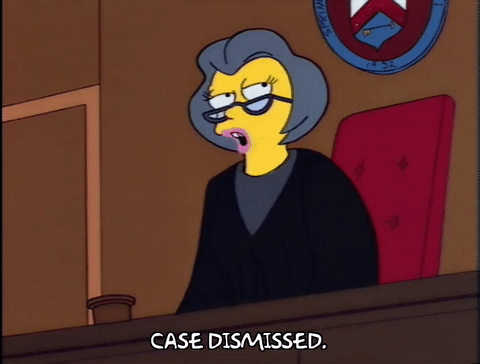 In TSP Operations, LLC v. Wells Fargo Bank N.A., the Fifth Court listed several deficiencies in an appellant’s brief that justified dismissal of the appeal, after appellant did not cure the deficiencies in response to a notice from the Court. For reference, here is a copy of the brief. No. 05-17-00131-CV (August 7, 2017).
In TSP Operations, LLC v. Wells Fargo Bank N.A., the Fifth Court listed several deficiencies in an appellant’s brief that justified dismissal of the appeal, after appellant did not cure the deficiencies in response to a notice from the Court. For reference, here is a copy of the brief. No. 05-17-00131-CV (August 7, 2017).
 In a construction dispute about work performed in Johnson County, Plainitff Brown said venue was proper in Dallas County because Defendant Ken-Do had a principal office there. Ken-Do argued that venue was proper in Ellis County.
In a construction dispute about work performed in Johnson County, Plainitff Brown said venue was proper in Dallas County because Defendant Ken-Do had a principal office there. Ken-Do argued that venue was proper in Ellis County.
- The Fifth Court rejected Brown’s argument, finding that his only probative evidence related to Ken-Do’s post office box in Dallas, which “at most, . . . showed someone on behalf of Ken-Do retrieved its mail in Dallas County, not that a decision maker did so.”
- But the Court also rejected Ken-Do’s position, which relied on its registered office in Ellis County: “A registered office is nothing more thatn the location an entity has designated where it can be served with legal process. It does not show the principal decisionmakers of the entity conducted its daily affairs from that loca
 tion.”
tion.”
Accordingly, the Court reversed the final judgment below, and remanded “to conduct further proceedings on the issue of venue.” Ken-Do Contracting, LP v. F.A. Brown’s Construction, LLC, No. 05-16-00373-CV (Aug. 7, 2017) (mem. op.)
